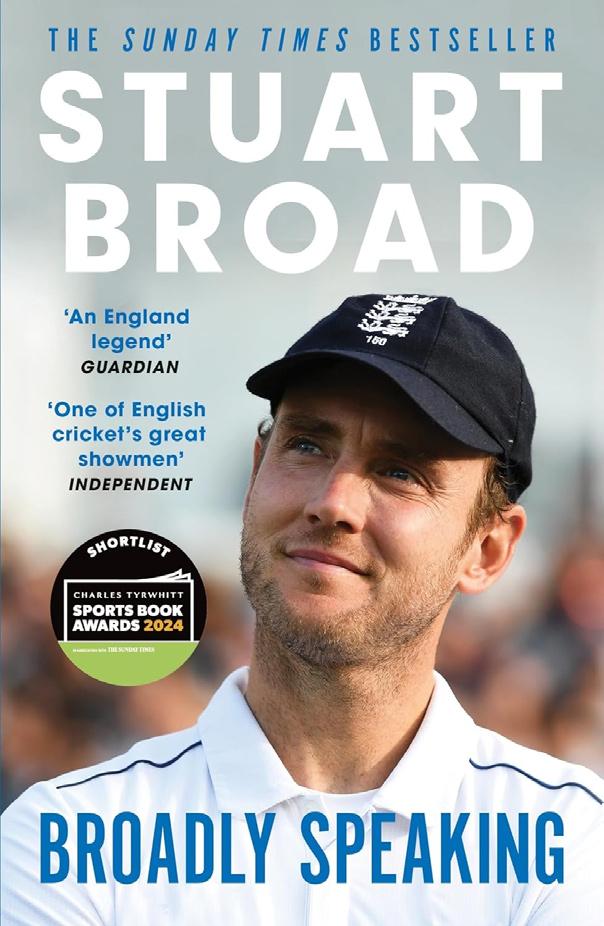
BY JOHN INVERDALE

BY MARK POUGATCH


MODEL FAMILY
BY LOLA KATZ ROBERTS

TAKE FIVE Toronto’s hot-spots for the avid fan
BY GEORGE SMYLY


BY JOHN INVERDALE

BY MARK POUGATCH


BY LOLA KATZ ROBERTS

TAKE FIVE Toronto’s hot-spots for the avid fan
BY GEORGE SMYLY

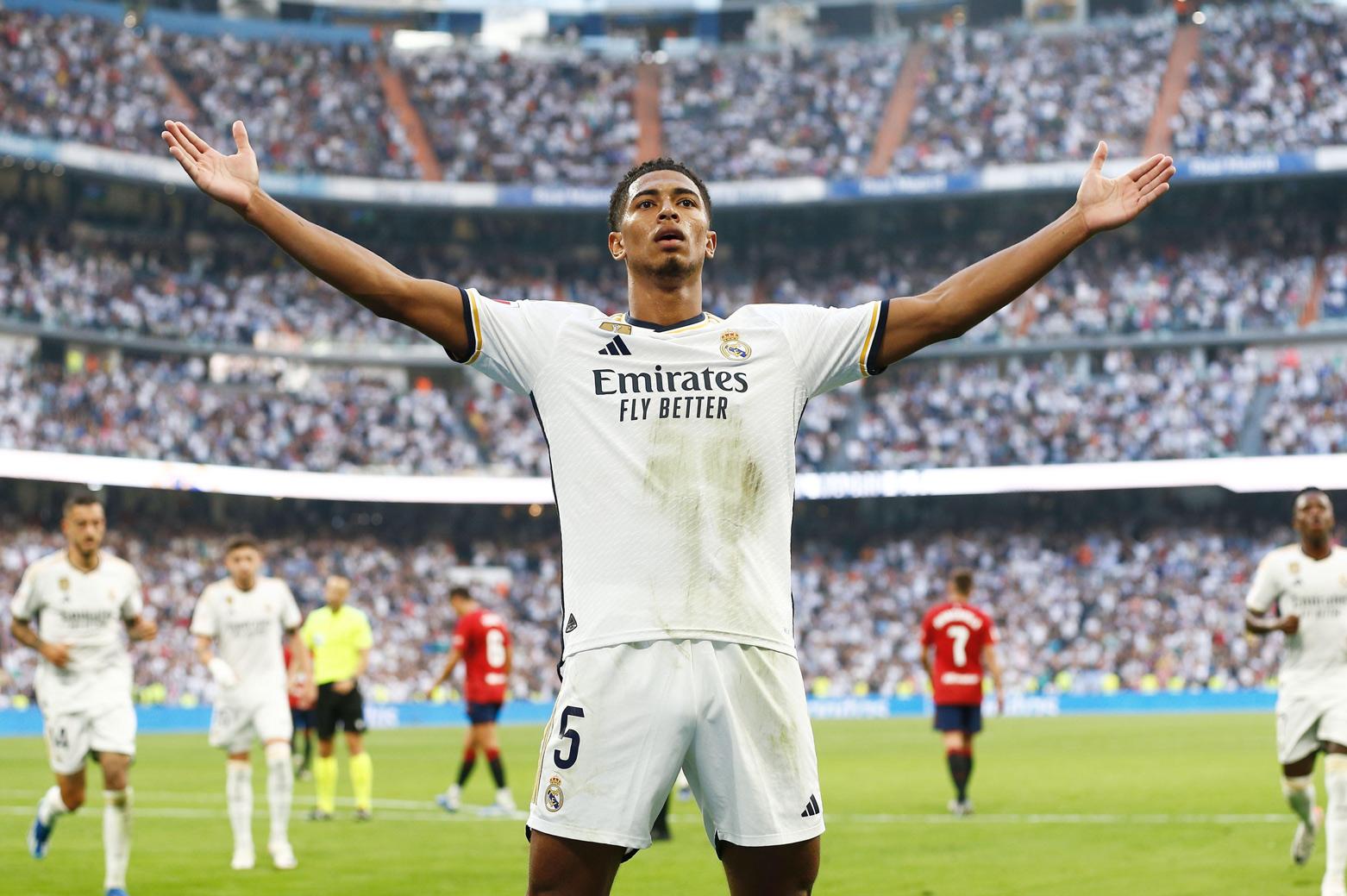
Jude Bellingham has made the move to Real Madrid look easy, but thriving at the world’s biggest club takes more than just talent – says two-time Champions League winner Steve McManaman
WHEN REAL MADRID CAME CALLING for me, it was January 1999 and they had just won the Intercontinental Cup. That white shirt, the Puskases, the Di Stefanos… I had the chance to join the best team in the world, and I felt I had to give it a go.
Leaving Liverpool wasn’t an easy decision, I was playing every week and playing well. I knew I had a choice to make – it was either commit my future to Liverpool and see out my career there or make the jump somewhere new. Liverpool and Real Madrid are quite similar in how they operate. They have great history, beautiful stadiums, and lots of pressure to be successful every year. The big change
was going from Liverpool, a city of 450,000, to a Spanish-speaking capital city.
Nowadays clubs do everything to help the transition, but back then things were different. The club did nothing to help me acclimatise. I went out there for a few days before pre-season with my wife and looked at about 20 houses because I didn’t want to live in a hotel for too long. I think if you live
There was a general feeling of suspicion. People were questioning decisions and wondering if the changes were going to work.
in a hotel for any amount of time – even if it’s only a month or two – you’ll go stir crazy. I had my own house from the start, which really helped, but I did that off my own back. Madrid is like Liverpool in that they have an attitude of: “We’ve signed you because you’re the best – just get on with it.”
ARRIVED IN A TRANSITIONAL PERIOD.
IThere was a clear-out of half a dozen big characters in the dressing room. Christian Panucci went, Davor Šuker went, Predrag Mijatovi´ went. Lots of new players arrived and there was a general feeling of suspicion. People were questioning decisions and wondering if the changes were going to work.
The first few weeks on pre-season tour, whenever the Spanish-speaking lads invited me out for a drink I always said yes. I just sat with them even though I couldn’t understand. Every time they looked at me, I would smile or put my thumbs up – I had to show them I wanted to be there. Once the football started, I knew everything was going to be all right. I had a good start and scored in my first three games.
It was a strange season for us. We had to go to Brazil for the Club World Cup in January 2000. When we came back, we had about five games in hand, which we had to play in a short space of time. That’s when it all clicked and we became a proper football team.

→ We had a few injuries and stumbled into playing three at the back. Once the Champions League resumed, we looked really strong. We played Valencia in the final and they were favourites for it, having finished higher than us in La Liga that year. But we came back a different side after Brazil and we won really easily.
It was brilliant to score in a Champions League final, but the best thing about that goal was that it put us 2-0 up and you just saw their heads go. 1-0 was hard enough for them, but at 2-0 they were done, and we quickly got the third so we could enjoy it. You could hear the olés ringing around. To lift that trophy just ten months after joining was immense. That’s what Real Madrid do –it’s all about the Champions League.
Real Madrid also never stand still, and that summer there was more change. Club president Lorenzo Sanz forced an election early because he had won the Champions
I have a crystal ball. Come the end of July, The King’s colours will be in the winners’ enclosure at Royal Ascot, Labour will have won their first General Election in 19 years and England will have ended their 58-year wait for a major trophy! But making predictions is easy. It’s the getting them right that counts.
What we didn’t call five years ago, was a total reboot of the outgoing government’s approach to betting and its subsequent impact on horse racing funding. We also didn’t anticipate that the UK’s big bookmakers would be turning their attention Stateside.
We’ve always tried to be quick on our feet, so we will be investing even more in our UK team, as we know that there is still a massive appetite for racing in this country. As ever, thank you for your continued support and enjoy the summer (as you should) with a glass of Pimm’s!

William Woodhams, CEO
League twice in three years – but Florentino Perez came in and won.
Perez brought in Luis Figo – the first galactico of the new era – and once the story came back into the English press there was a bit of a miscommunication. No one ever said they wanted me to leave. Of course, Luis came in and was a big-money transfer, so there was a lot of talk – I was reading different things every week. But the manager came to me and said: “Don’t worry you’re not going anywhere,” and Perez never once said we want to sell you. Maybe they were subconsciously trying to make it difficult for me so I would leave of my own accord, but that never really occurred to me.
THE MEDIA IS MORE INTENSE in Spain: every day Marca and AS write ten pages of stories about Real Madrid. Sometimes they’re just filling column inches. I think that’s where the perception comes from that Gareth Bale, for example, wasn’t well thought of there. I don’t think Gareth was forthcoming in talking to them, so they just took the opportunity to have a go. He was in Madrid for a long time, and it was just in the last few years when things started to get more difficult. Then you had that “Golf, Wales, Madrid” picture, which obviously the fans didn’t like, and the press went to town on him from there.
If you lived in Madrid, the story was different. He was well-liked by his teammates and by the fans. He probably should have done an interview on English TV and said, “I love it here, I love the fans,” and put everything to bed. But the fact that he didn’t, meant the story grew arms and legs. It just wasn’t in his character. You don’t see or hear from him much at all now he’s retired, and that’s just who he is. He didn’t feel that he needed to stick up for himself.
The other side of playing abroad is off the pitch. It’s not just you – your wife has to be happy; your children have to be happy. For Michael Owen, I think it didn’t work out in Madrid because his family found it tough. They were living in a hotel and they had young children. I went over to see him there and he was well-liked and scoring plenty of goals. It was just right place wrong time. He wasn’t going to stay there without his wife and kids.
‘It’s the way he holds himself, the way he speaks. He’s still humble even though he’s a superstar already – he’s got no ego...’
Jude Bellingham has made that transition look seamless. I think the fact that he’s lived in Dortmund has massively helped. I interviewed him a couple of days ago and he’s a super player, but what a man he is as well. It’s the way he holds himself, the way he speaks. He’s still humble even though he’s a superstar already – he’s got no ego, which is essential when walking into that Madrid dressing room.
Every team in England wanted him at 16, so the fact that he chose Dortmund ahead of
WEDNESDAY 2 AUGUST 2023
INVESTED £2,000 FOURFOLD SELECTION Sheff Utd Relegation @ 8/13
Premier League Cheltenham Relegation @ 6/4 League 1 Leicester Promotion @ 5/4 Championship Derby Promotion @ 11/8 League 1 RETURNED £43,160 MONDAY 21 MAY
SATURDAY 13 JANUARY
INVESTED £100 TRIXIE SELECTION Rare Edition @ 11/8 15:50 Kempton WON Jasmine Bliss @ 2/1 15:57 Wetherby WON Bill Joyce @ 85/40 16:05 Warwick WON RETURNED £46,187
SATURDAY 27 JANUARY
INVESTED £500 EIGHTFOLD SELECTION Gustav Graves, TOP 3 @ 11/8 17:15 Newcastle Likeashadow, TOP 3 @ 8/11 17:45 Newcastle Cargin Bhui, TOP 3 @ 4/5 18:15 Newcastle Revolutionise, TOP 2 @ 5/4 18:30 Kempton Beneficiary, TOP 3 @ EVS 18:45 Newcastle Premiere Beauty, TOP 3 @ 4/11 19:o0 Kempton The Caltonian, TOP 2 @ 1/2 19:15 Newcastle Max Vega, TOP 3 @ 10/11 19:30 Kempton RETURNED £64,877
WEDNESDAY 7 FEBRUARY
INVESTED £1,000
SELECTION Chelsea 3-1 @ 22/1 vs Aston Villa RETURNED £23,000
all the biggest English clubs showed that he could see the bigger picture. He wanted to go somewhere where he knew he would play and come back a better player.
It’s a new generation now with Vini Jr, Rodrygo, Endrick and Kylian. Everybody who’s anybody wants to play there. The pulling power they have is frightening for the rest of Europe and they’re now in a place with the likes of Mbappe where they don’t need to chase anyone. Real Madrid don’t sign players because they need them, players come to them. Vini, Bellingham, Rodrygo, Endrick, Kylian all want to play similar positions. Real Madrid will never stand still, so there will be more superstar signings. Can anyone stop them? You'd be a brave man to bet against them! n
As told to Lola Katz Roberts
WEDNESDAY 13 MARCH
INVESTED £500 DOUBLE
SELECTION Scottie Scheffler @ 5/1 The
WEDNESDAY 10 APRIL
INVESTED £54 DOUBLE @ 40/1
SELECTION I Am Maximus, TOP 5 16:00 Aintree WON Max Homa, TOP 5 The Masters 3RD RETURNED £2,214
SATURDAY 13 APRIL
INVESTED £5 COMBINATION TRICAST SELECTION Vanillier @ 20/1
16:00 Aintree UNPLACED I Am Maximus @ 7/1
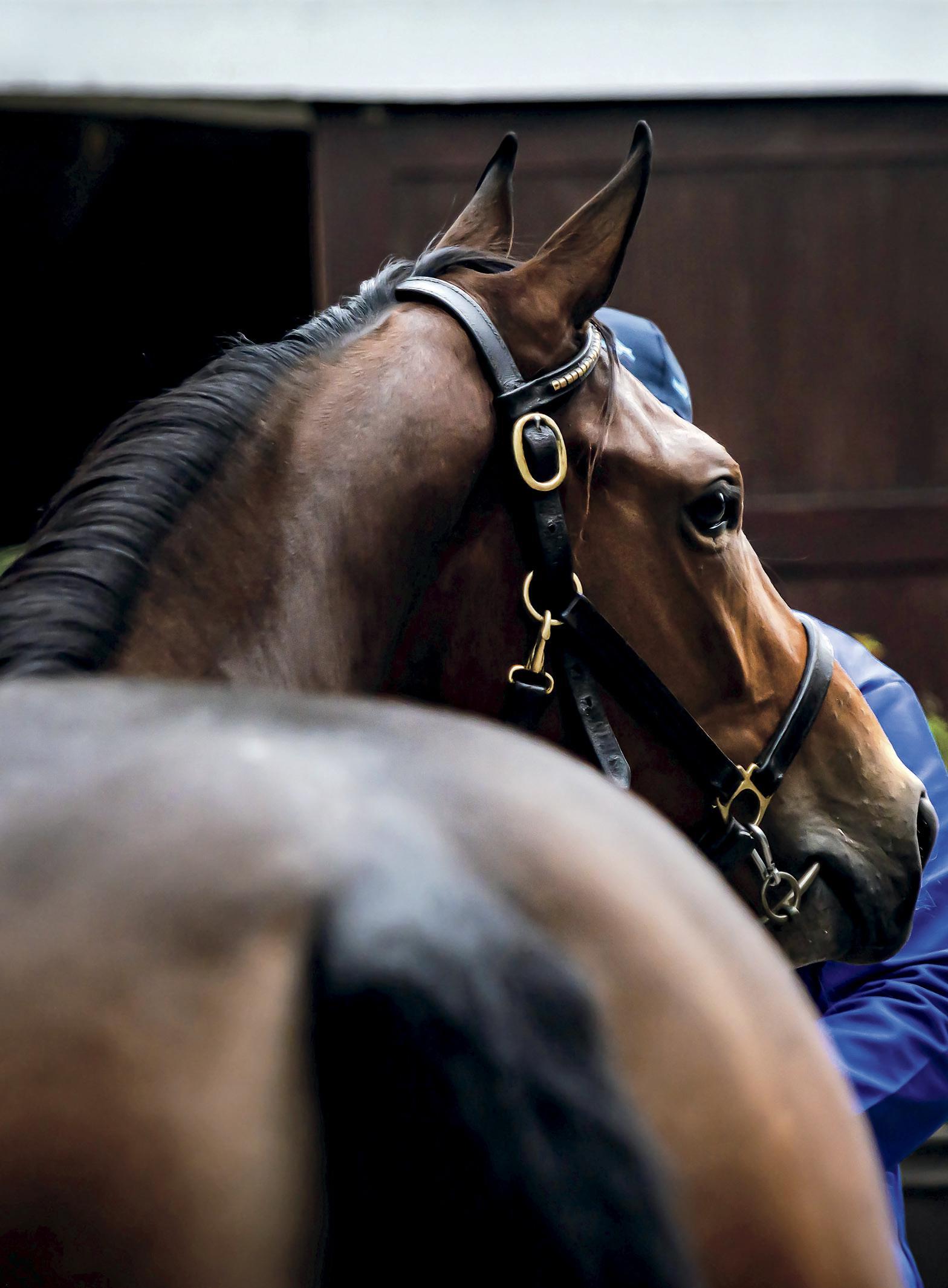

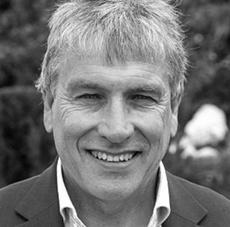
O HERE’S YOUR STARTER FOR TEN. How many of Great Britain’s 22 gold medallists in the Tokyo Olympics can you name? And for your bonus, how many of the other 42 medallists trip readily off the tongue?
Adam Peaty. Obvs.
And while you’re thinking, here’s something else to ponder on. The budget for Team GB across the four years leading up to those Games was £342 million.
Max Whitlock.
It’s very easy to get caught up in an Olympic and Paralympic frenzy once every four years. London 2012 remains an indelible memory for a sizeable chunk of this country’s population, mostly for how it made us feel as human beings rather than for the gold rush and the rowers who cried but who’s names you’ve forgotten.
Tom Daley.
But there are bigger issues at play here. Societal ones. Our society – where more than a quarter of the population are categorised as obese, and in some parts of the country that number rises to 40 per cent. An education system in which the number of PE teachers has dropped by more than 10 per cent in a decade.
In short, a world where every medallist who stands on a podium declaring their extraordinary feats will “inspire the nation” is indoctrinated and deluded. Many of those who already play sport will undoubtedly be fired up to greater feats later in life. Most people will say “well done” and head to KFC.
Jason Kenny. Keep going.
And as the world heads to Paris with its fingers, toes and every other moveable body part crossed, hoping the Games will pass off without some unimaginable incident, there’s also the question of the cost and the relevance. Once upon a time, the Olympics were the only show in town when it came to bringing the world together for a sporting celebration. These days we are all united 24/7 via our TVs, phones and watches. From the NBA to the IPL, we are global sporting junkies all.
Back then, the knowledge that it was an ‘Olympic year’ was a sporting topic of debate for months in anticipation. Now, it comes after the Euros and is mercifully squeezed in just before the Premier League resumes. It’ll get zillions of clicks on TikTok and Instagram, but will have faded into the history books as soon as Liverpool win their first match under Arne Slot.
Lauren Price.
So do the Olympics matter any more? Tokyo’s bill for staging the Covidaffected Games in 2021 was more than £10 billion. What else could that money
A world where every medallist who stands on a podium declaring their extraordinary feats will ‘inspire the nation’ is indoctrinated and deluded.
have been spent on? France is anticipating a cost roughly half that amount, but 45,000 police will be on duty for the opening ceremony alone. If you’re thinking of planning a robbery on the Champs-Elysées, that’s the night to do it. It’s big, it’s bloated, and across the board it just costs too much. And for what?
The mountain biker. Give me a sec…
To go to Athens last summer, less than 20 years after the Olympics took place there, was a profoundly depressing experience.
Kelly Holmes. You all remember that.
Venues that had lit up the world now lie abandoned. The IOC had a golden opportunity to take so much of the cost and the chicanery out of the Olympic movement by making Athens the Games’ permanent home, but a lack of vision and an avalanche of individual ego meant that proposal never got off the ground. And here we are now, with Brisbane as the host for 2032 because nobody else wanted it. Sound familiar? Is the Olympics heading down the road of the Commonwealth Games?
Have to hurry you.
Once every four years, you’d watch the Games and wonder where Vanuatu was. Now, courtesy of Google, you probably know that Bislama is the official language there. Back then, you’d know every British medallist, never mind those who won gold, because there weren’t that many, and they all made us very happy. Now there are so many, their value is intrinsically diminished.
In the most ludicrously simplistic terms, £342 million pays for 2,000 PE teachers across four years – 2,000 PE teachers to instil exercise and nutritional common sense into the next generation of Burger King loyalty card holders. Billions of euros could be spent on improving the housing situation in some of the most dreadful banlieues in the north of Paris, rather than allowing President Macron to showboat by swimming down the Seine. And so it goes…
But as someone who’s had the thrill and the privilege of attending 10 Olympic Games, do I really believe all the above? I honestly don’t know. But it’s dishonest not to have the conversation. The Olympics ‘just happen’ every four years because they always have. That doesn’t mean they always should.
And the real starter for 10 in this most impossible of University Challenge conundrums, in a world beset by so many bigger and more profound issues, is: “Where should elite sport sit in the budgeting requirements of a nation?”
Now don’t all rush to answer that one. And look up the list of medallists, by the way. After all, it’s what you do with everything else.
John Inverdale is our tennis Ambassador and a broadcaster for ITV and the BBC.

Proudly sponsored by tickets from £20


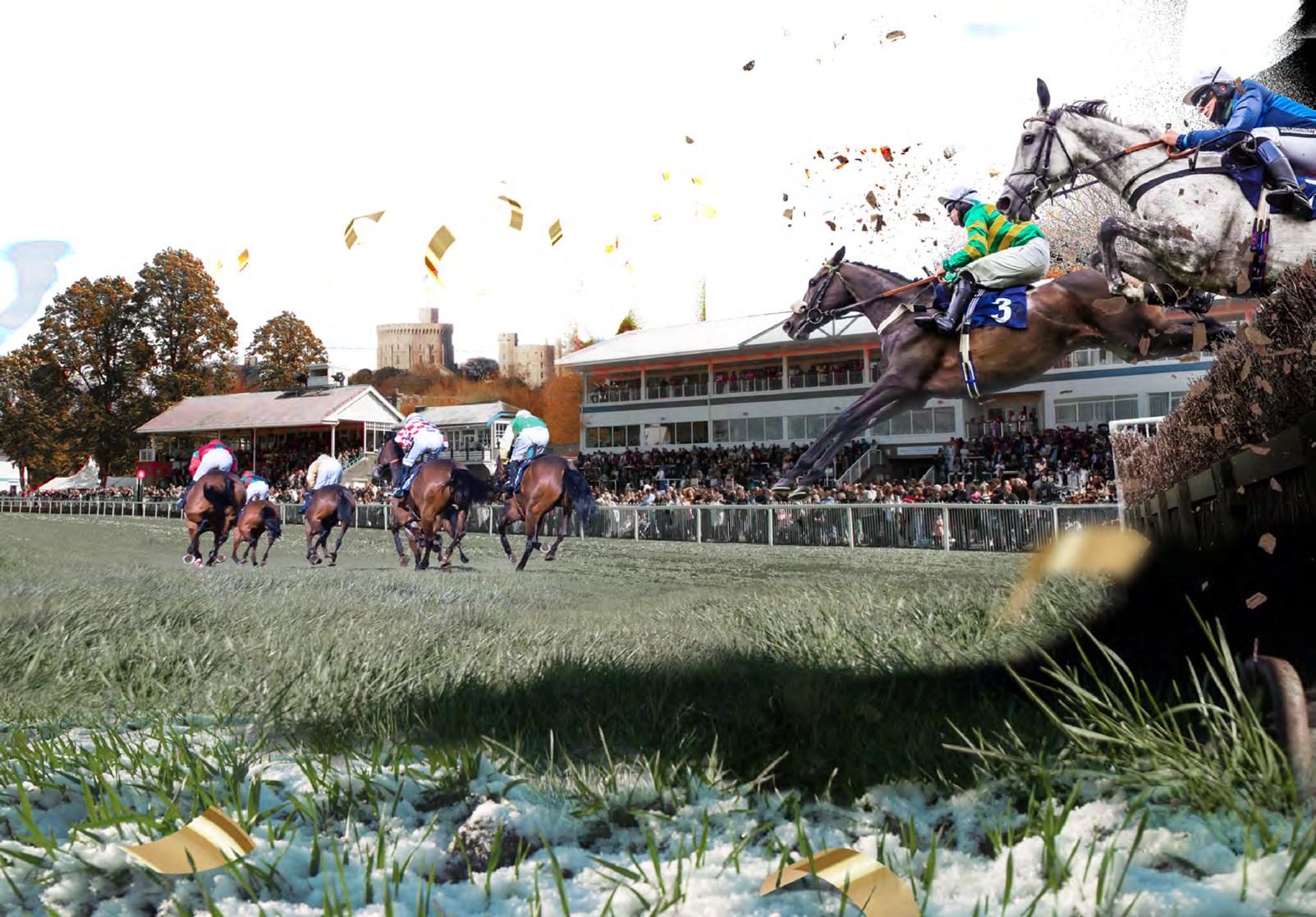

Rob Wright recalls the sweetest six furlongs of his life
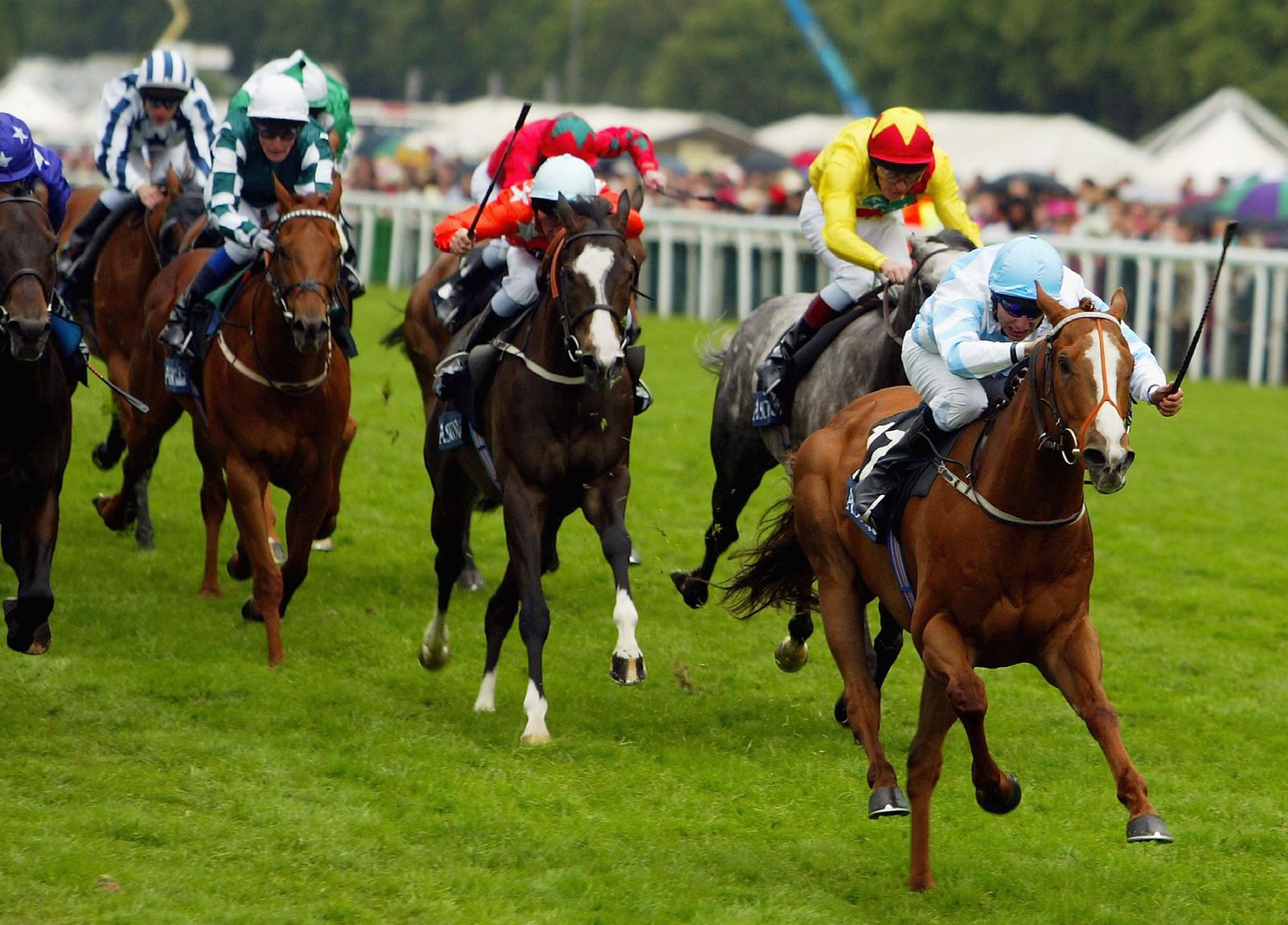
‘MAKE THE MOST OF THIS MOMENT – it’ll never happen again.” Life seemed so easy at that point that the words briefly jolted me, in the wake of a wellplanned coup after Lafi had landed the Wokingham Handicap at Royal Ascot back in 2004. The advice came from my great friend, Henry Rix, with whom I shared ownership of Lafi, along with his father, Bill, and friend Peter Jacob. Of course, he was spot-on – coups in races like the Wokingham are so rarely pulled off.
At the time, though, we were on a roll. The purchase of Lafi – for 38,000 guineas out of the stable of the late Alec Stewart – had been funded by the success our partnership had enjoyed with True Night, who Henry had spotted as a bargain at 17,000 guineas from the Henry Candy yard at the end of 2001. True Night proved a real money-spinner, with his seven wins in our silks comprising a competitive handicap at Glorious Goodwood, the Brighton Mile, the Beeswing Handicap at Newcastle, a pair of Ascot strikes and two valuable pots at Chester. Under the right conditions, he was really reliable –he rarely disappointed when he was fancied, starting favourite every time he won for us. If only it were always that simple!
He certainly seemed to benefit from the magic touch of Dandy Nicholls, who died far too young at the age of 61 in 2017. As has been well documented, Dandy was brilliant with sprinters. True Night was a seven-furlong specialist – a stayer by Dandy’s standards! – but he proved perfectly well suited to the training regime at Sessay, near Thirsk. He ended up being an absolute superstar for our syndicate.
Lafi was a cast-off from Hamdan al-Maktoum. A son of the speedy Indian Ridge, he had cost 180,000 guineas as a yearling and showed a good level of ability, winning three of his `seven starts for the Stewart stable. Given the ability he had shown, we picked him up surprisingly cheaply. He had been campaigned over seven furlongs and a mile, regularly tanking through his races but not always seeing them out. Henry was pretty sure he could be even better as a sprinter and, in Dandy, we had the obvious man for the job. It proved a potent combination.
He finished an eye-catching seventh of 19 on his first start for us over six furlongs at Thirsk, having no problem with the shorter trip but finding some trouble in running under subsequent Grand National-winning rider Liam Treadwell, who at the time was a 7lb-claiming apprentice on the flat. Lafi followed that with a fine third from a wide draw at Epsom on Derby day, ridden by Dandy’s wife, Alex Greaves.
Dandy’s runners always needed their first run or two of the season and the Epsom run had put Lafi spot-on for our long-term target, the Wokingham Handicap at Royal Ascot. He was still unexposed as a sprinter and, after that promising Epsom run, the 20/1 being offered antepost for the Wokingham was too tempting to resist. We managed to get some fair bets on in cash, in shops spread from London to Manchester, and booked Eddie Ahern for the mount. Eddie fell into bad company some time later – he was banned for ten years in 2013 for race-fixing – but at that stage he was one of the best riders around.
Everything was set fair for Ascot, with the ground riding
firm, and while Lafi’s draw on the far side in stall 30 was something of an unknown, we knew Dandy was delighted with his condition. Despite it being such a competitive handicap, Lafi was sent off the 6/1 favourite.
As is so often the case, the Wokingham field split into two groups, and from his draw Ahern had no choice but to keep Lafi on the far rail in the early stages. He wisely switched him out with two furlongs to run to ensure a smooth passage and, approaching the final furlong, asked Lafi to quicken. The response was electric – at least to these eyes – as he powered clear on the far side and comfortably saw off the stands’ rail group, which provided both the second and third. Cue wild celebrations that ended with some much-needed food at Pennyhill Park Hotel, near Ascot, where my usually sensible wife was twice cautioned for her use of the whip on a gold horse that was stationed in the hotel’s foyer! I have a hazy recollection of joining in with a wedding party at the hotel –either way, the Bacchanalian scenes lasted long into the night.
It turned out to be the only race Lafi would win for us – he suffered a minor injury after the Wokingham but came within a short head of landing a group three race at Sandown the following season. Even so, we could not have asked for more from him. As is annoyingly often the case, though, my friend Henry was right – it hasn’t happened again, although we did land the 2005 Stewards’ Cup with Gift Horse. But that’s another story. n
Rob Wright is Racing Editor for The Times.
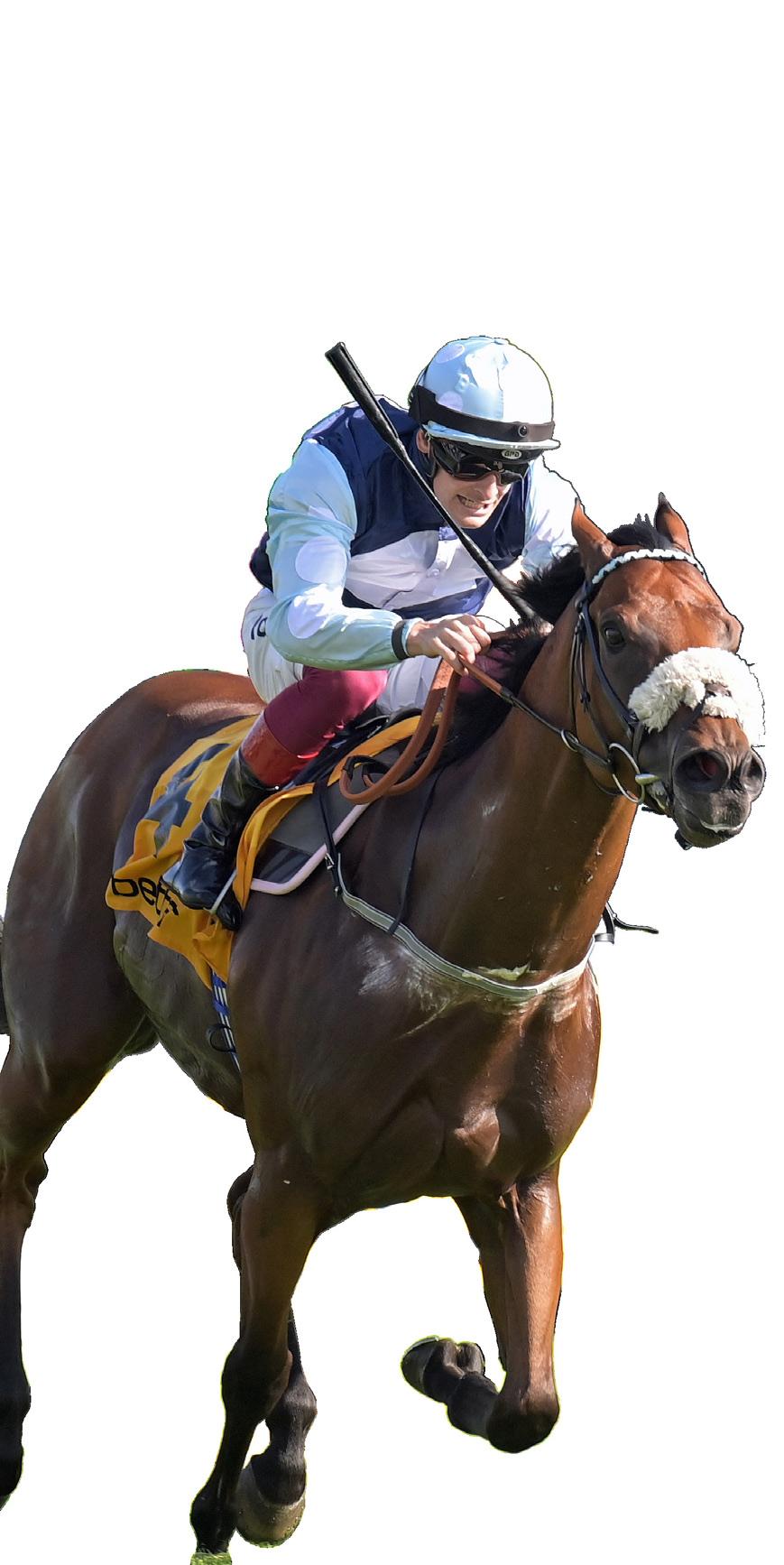
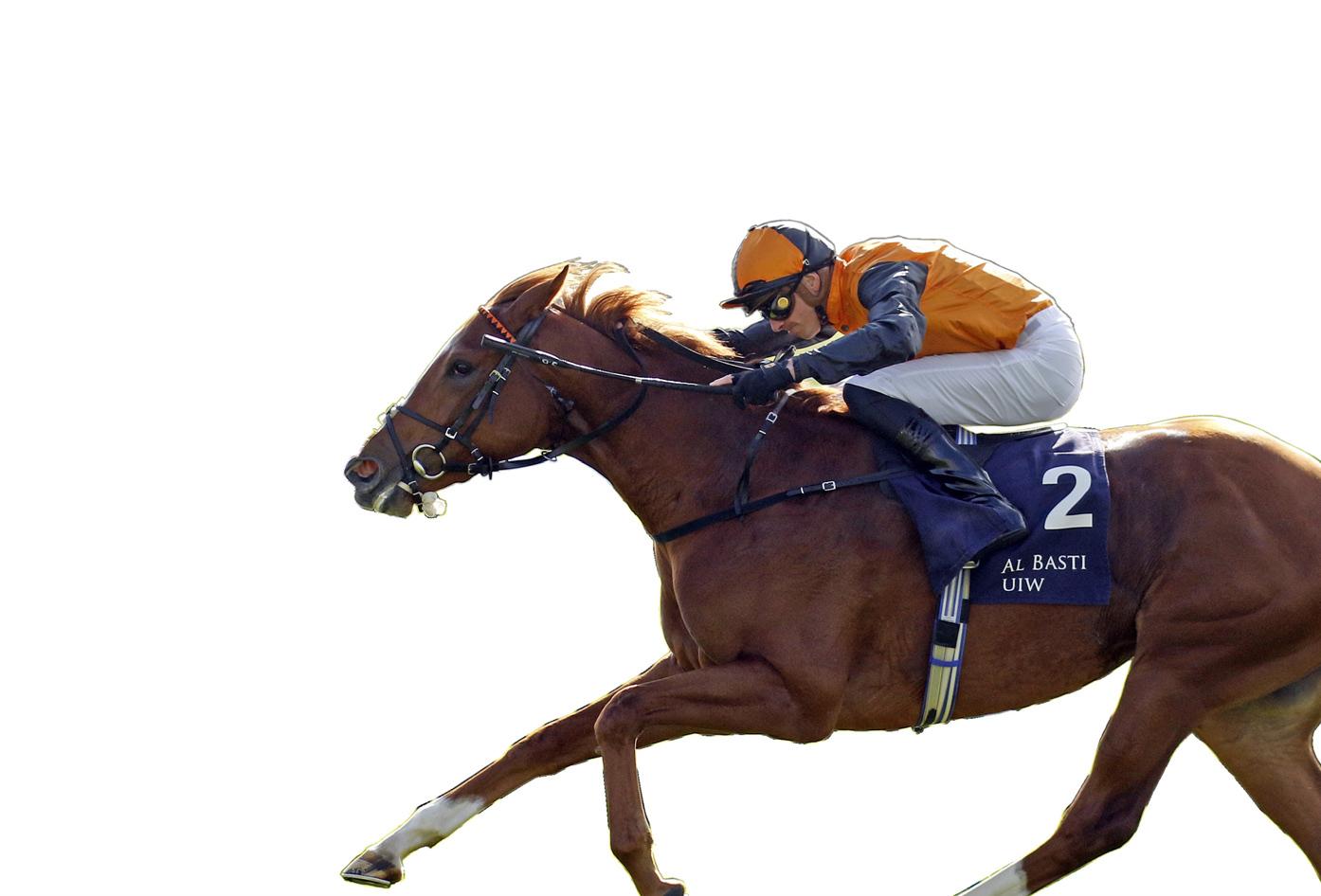
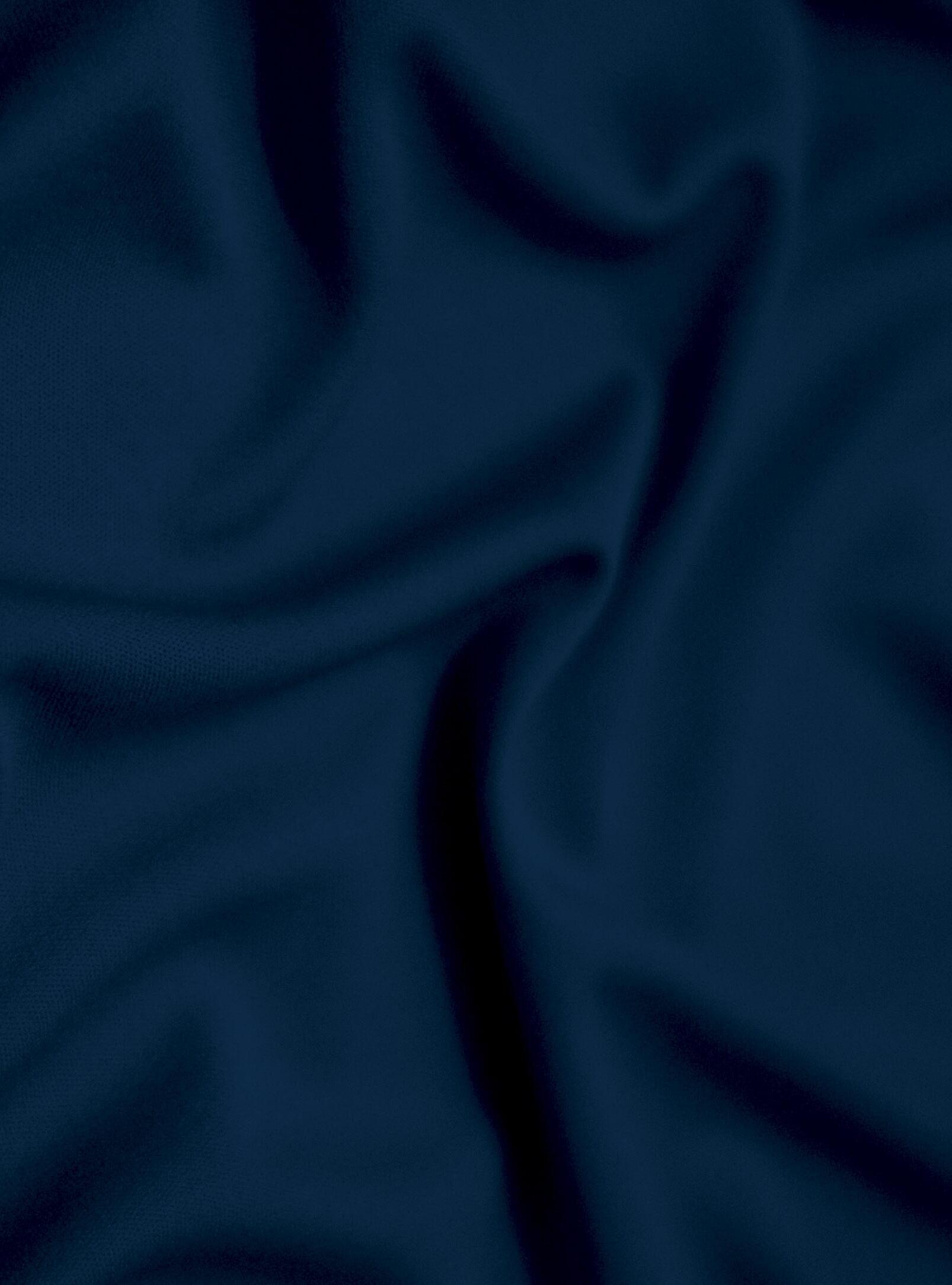
“I’ve got an idea.” Peter Molony, bloodstock agent supremo, tells me on a crisp February morning. A few months prior, I’d asked him to find me a horse to run in this year’s Grand National. Up to that point, I’d always thought it was impossible to buy a horse capable of running in the famous old race. But this is a man who found Champion Hurdle heroine Honeysuckle, Gold Cup scorer Bobs Worth and dual Festival winner Sir Gerhard, among others. He knows his stuff.
He’d sourced a horse who had just won the Thyestes at Gowran Park (a recognised National trial), was trained by Henry De Bromhead and looked to have a lovely racing weight. What’s not to like? “Yeah, go for it,” I told him. And that’s how I ended up with Ain’t That A Shame. I’d watched his races back plenty of times and he was quite keen in the early exchanges. He’d obviously won on his most recent start, but even then he’d seemed headstrong. “If Rachael Blackmore can’t hold him, what chance do I have?!” I remember thinking to myself. But anyway, on to Aintree and a ride in the big one.
The day of the race arrives and I am determined to take it all in. When I first got into racing, my sole ambition was to ride in a few point-topoints, perhaps to win a couple. Now, I’m riding in the bloody Grand National! It’s about 15 minutes before post time and I’m sitting in the weighing room with Paddy Brennan and Harry Skelton. Davy Russell – a great storyteller and one of the nicest men in all of racing – joins us and is reciting tales from former Aintree Festivals. Although the TV cameras are in there (this is unique to the National), it all feels incredibly relaxed.
Even on this day of all days, I’m determined to stick to my process. I know what I’m doing; I’ve ridden over these fences before with some success. Cat Tiger was a gallant second in the Hunters’ Chase here not so long ago. I weigh out, canter down to the start, show my horse a fence and walk in. Now is not the time to try anything different. Routine is everything. But it still isn’t lost on me that this is the National. It’s an entirely different beast from anything I’ve encountered in my career thus far. The size of the crowd. The noise from the crowd. It’s just past 4pm and everyone is quite drunk by now. The energy from a packed-out grandstand is electric.
I’m a 45-year-old amateur rider and this is the most-watched race in the world. “Don’t mess this up!” is the first thing that comes to my mind as the starter motions to raise his flag. “Am I riding too short? Am I going to tip up? What am I doing here?” These are all the things going through my head.
by David Maxwell
‘It’s just past 4pm and everyone is quite drunk by now. The energy from a packed-out grandstand is electric.’
I’ve only sat on the horse once before, remember. “Oh well, we’re here now. Let’s get on with it,” I tell myself as the tapes go back. We get into a lovely rhythm and we’re measuring our fences beautifully. I remember Rachael saying to me: “He’s not fast enough to run away with you in a Grand National.” She was right, as always. We’ve got a nice position and I’m thinking this is going really quite well. And then we reach the Canal Turn for the first time.
It’s one of those fences where you can’t give yourself any room. You’ve got to jump it at the corner and at an angle. There’s no going in and ‘popping’ it. I wing the fence, but unfortunately one of the McManus horses, Limerick Lace, makes a howler. She almost comes to a stop right in front of me. We clip heels. “Oh no, here we go,” I think to myself.
But the partnership remains intact, and on to the next obstacle we go. The confidence remains sky high. “This is going really well. I’m a really good jockey. And I can see a stride from miles off,” I say to myself. I give him a little squeeze heading into the next plain fence. “One, two…” and he goes: “Three!” And he demolishes the fence. “Sorry lad.” I say in his ear. “We won’t be trying that again”. I just sit quietly and let the fences come to us from then on. And he measures them perfectly.
We cross the Melling Road for the second time and we’re still lobbing along right on the heels of the leading bunch. The thought crosses my mind: “Wow, I might nearly win this!” I’m only human, after all. If Sam Waley-Cohen can win this as an amateur, why can’t I?
The run down towards two-out feels like an eternity. I can see what’s dropping back and what’s still going well. Minella Indo and Delta Work – proper Gold Cup horses – are still in the mix. I look around and my ambitions quickly turn to: “Let’s try and run into a place here.” I jump the second last with I Am Maximus. He sprouts wings heading down towards the last, while my effort begins to peter out. Towards the final fence we can’t quite live with those class horses. We stick to our task over the final fence, past the elbow and up the runin. I’m determined to hit the places, though.
We get up to pinch sixth place from Meetingofthewaters and our race is run. Sixth place? On Grand National debut? For an amateur rider? Not bad. What an incredible thrill. Will we be back next year? You bet we will. We’ll go for the Becher, the Thyestes and then back to Aintree for another crack. Look forward to seeing you all there. n






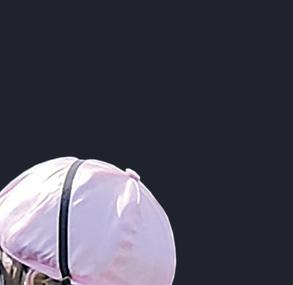





























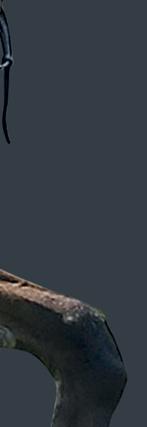











Simon
Burns on his colourful 30 years as an MP

WHEN I WAS FIRST ELECTED TO THE HOUSE OF COMMONS in June 1987, Margaret Thatcher was at the height of her powers. I got an early glimpse of her in operation when, just after the election was called, all candidates were summoned to a motel by the South Mimms service station on the M25 to be photographed with her for our election addresses.
In the evening there was a dinner which she addressed, and while she was speaking a candidate was unwisely having a conversation in sign language with the chair of the dinner, who was sitting next to Thatcher. At one point in this conversation, the hapless candidate was moving his head in a negative way. Thatcher immediately saw him and stopped her speech. Looking at him, she shouted: “Do you disagree with me?”
Instead of mumbling “no”, he stupidly stood up and started with the immortal words “I didn’t mean to be rude”, to which Thatcher, cutting him off, bellowed: “Well I think you are very rude. Sit down!” Two hundred ambitious candidates smirked and noted there was one less person to worry about if they were elected and tried to climb the greasy pole.
I often wonder if, when I die, the only thing I will be remembered for is my feud with the former Speaker of the House of Commons, the appallingly unctuous and pompous John Bercow. Amazingly, in the early days I got on well with him. However, as time progressed and he moved from being very right-wing to a leftie – and grew in pomposity with a manner of speaking that suggested he read a dictionary each night before going to sleep – our personal relationship deteriorated badly. In the year he was Speaker, before the coalition government was elected in 2010, he frequently hauled me up and tongue-lashed me in the Chamber, which was good for my street cred but little else.
The final break came just after the coalition was formed and I became a health minister. At the first Health Oral Questions in the Commons, he criticised me so often as I answered questions that finally, after he tried to belittle me with Labour MPs, I quietly muttered: “You stupid sanctimonious little dwarf.” With hindsight, the “little” was superfluous, and fortunately for me he did not hear.
What I was unaware of at the time, but soon discovered, was that a journalist in the Press Gallery could lip read. He rang my private office and asked if I’d really called the Speaker a “stupid, sanctimonious little dwarf”. There was no point in lying, and at that point all hell broke loose, with every national newspaper reporting it and mulling it over, to the point where there were articles about whether this was the rudest thing that had been said in the Commons. At that point I worried that it was only a question of time before 10 Downing Street got on the telephone to reprimand me and tell me I had to apologise. Funnily enough, no call ever came through, and perhaps the answer became apparent five months later.
In November 2010, David Cameron became the first Prime Minister in 20-odd years to address a House of Commons lobby correspondents lunch, and he began his speech with a joke. He began: “All of you will know of my health minister Simon Burns, but many of you will not know that a few weeks ago in Speaker’s Courtyard, Burns inadvertently drove his car into the Speaker’s car, which was parked there. The Speaker witnessed this accident and in a rage came running out of Speaker’s House, shouting, ‘I’m not happy!’ To which Burns replied, ‘Well, which one are you, then?’”
For the next seven years that I remained an MP before retiring in 2017, our relationship never improved, and we were constantly crossing swords in the Chamber – but on the last day Parliament sat before the 2017 election, as is custom, I was in the queue to shake hands with the Speaker and bid farewell to the Chamber after 30 years. It is a perfunctory ceremony where the Speaker shakes you hand and bids you farewell, lasting literally a few seconds. I was not so lucky. He grasped my hand for literally a few minutes, whispering sweet nothings into my ear and asking if I would come and have a drink with him after the election was over. I am still waiting for the invitation – and it will never come, because he was the first Speaker in generations not to be appointed to the House of Lords, and now, due to an adverse report into complaints about his behaviour, he is barred from entering the Houses of Parliament.
ONE OF MY HAPPIEST MOMENTS AS AN MP was a meeting with Hillary Clinton. To say that I admire her would be an understatement. In parliamentary recesses in 2008 and 2016, I worked on her presidential campaigns in the United States. When President Obama came on a state visit to the UK in May 2011, his Secretary of State Hillary came two days early to sort out the details of the trip. William Hague, the Foreign Secretary, arranged for me to meet her at the Foreign Office while she was here, but on one condition… I turned up to the meeting, and when it ended I had to fulfil the condition that Hague had laid down. Since 2008 I had always worn a Hillary Clinton watch, and as the meeting ended he nodded to me and I rolled up my sleeve and showed Hillary my watch. At first she looked at it in disbelief, then she let out an ear-piercing shriek which made the Secret Service agents take a step forward. One was heard saying to the other: “What the hell’s he done to her?” She then grabbed my arm and led me down the stairs of the Foreign Office to the courtyard, shouting: “Get me Huma!” Huma Abedin was her chief of staff, who was in her car waiting to leave but was duly dragged from the car to admire the watch before Hillary and I, holding hands, were photographed viewing the now famous watch. Those were the days. n
Simon Burns was MP for Chelmsford from 1987 to 2017.
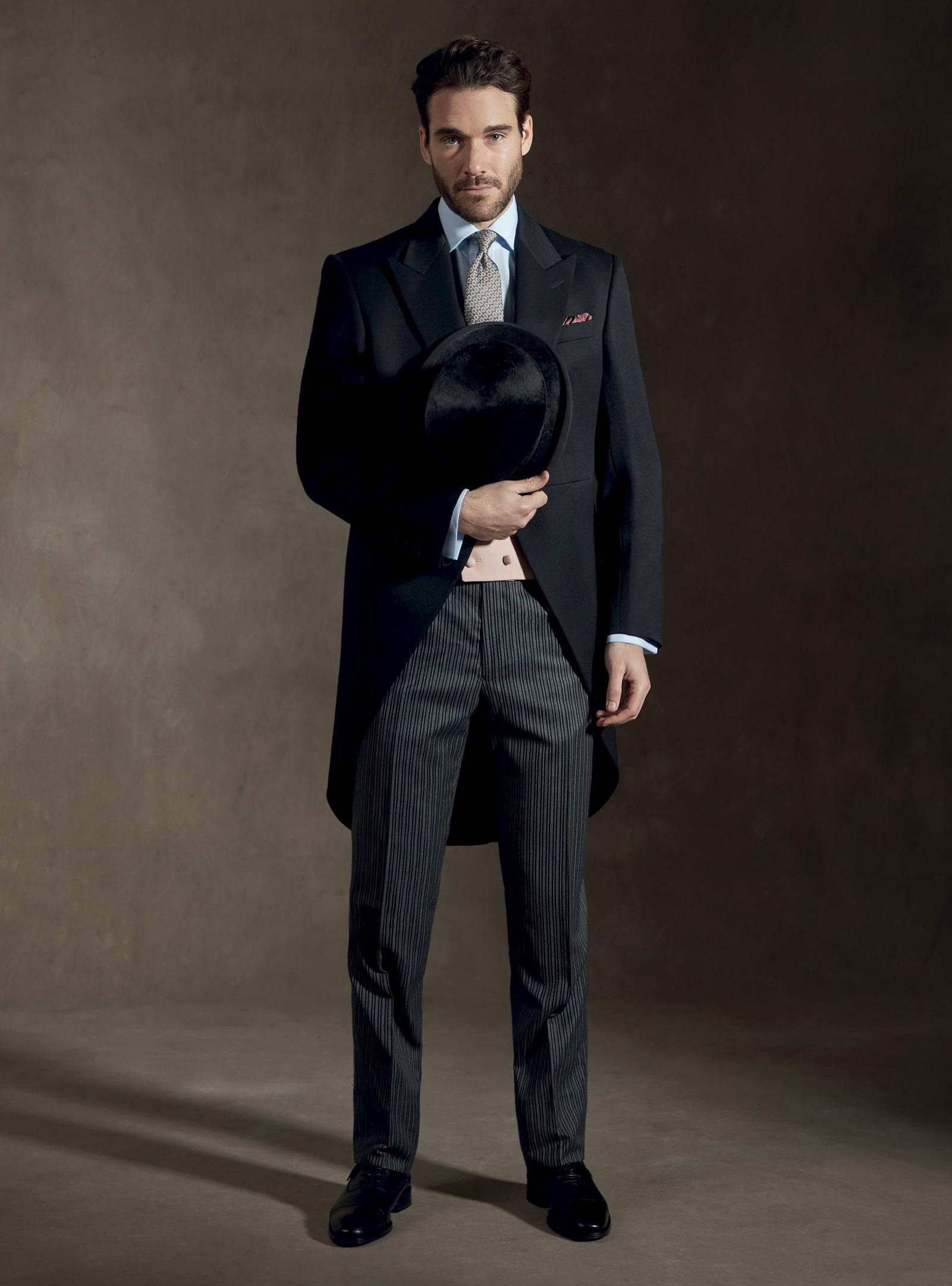

Will this be England’s year at last? For once, we go into a tournament with expectation rather than hope,

HERE ’ S A LIST OF THIS CENTURY ’ S big winners: France, Brazil, Greece, Italy, Spain, Germany, Portugal and Argentina. Now as we’re talking about the European Championship this summer, remove the two South American behemoths who won the World Cup in 2002 and 2022 respectively, and you’re left with European countries that have won either the Euros or the World Cup, or both, since the start of this millennium.
Included among them are four of the continent’s traditional heavyweights plus Portugal – with a population barely 1.5 million more than Greater London but a nation that has consistently produced intelligent, skilful players and also won the inaugural Nations League five years ago –and, with great respect, an outlier in Greece, who took George Graham’s ‘One nil to the Arsenal’ and wrapped it in blue and white on their way to an astonishing Euros triumph 20 years ago.
Of course, you will have clocked by now the glaring omission from that list: the
country with the most successful domestic league in the world, the most watched and the most envied, but you have to be well over 60 now to remember her last international victory. When will England ever win again?
After our ITV Euro 2024 briefing in London in April, I sat down for a cup of tea with Gabriel Clarke, quite simply the creator and maker of the best football pieces you will watch during the Euros coverage. We talked about our editorial rigour in Germany. What’s the top line going into this summer? What should we all (TV, media, pundits, the public) now anticipate from this England team? Should we actually be putting pressure on this England team to say simply: we now expect you to win?
If you do my job and you don’t selfevaluate critically after a programme, then you’re in the wrong industry. I am my own harshest critic. To be blunt, I don’t need a keyboard warrior in his mum’s spare room in Bolton to tell me where I went wrong, and the day after England’s cruel quarter-
final defeat to France in Qatar I was somewhat troubled. Had I – had we – gone a bit too easy on England in our post-match analysis? Had Harry Kane’s second penalty gone in, all the momentum would have been with England and – with the greatest of respect – Morocco was a semi-final opponent not to intimidate. Once again, after the semi-final defeat in Russia and the Euro heartbreak to Italy, a huge opportunity had slipped by. Look at the list at the top
Given that Gareth Southgate has shown some ruthlessness in the make-up of England’s squad, it all points towards a 4-1-41 formation to get the most out of England’s attacking players. This is what I’d love to see. Declan Rice has been magnificent for Arsenal and even though he’s impressed in a more advanced position towards the end of the season, he’ll be the defensive midfielder in this team. Modern-day football is obsessed with numbers, so Rice
Life and football are all about timing: it’s the hour to give Foden the keys to the house – from the centre of the pitch.
again and say to yourself: is it unreasonable to expect this squad – particularly given its attacking riches – now to break England’s 58 years of hurt?
I told Gabriel I think it’s fair enough to take that position now. Let’s be un-English and start with the good points before getting on to the concerns: the front six have huge potential. You can’t say definitively it’s the best in the tournament, but you can argue there’s not one better.
will be number 6, screening the back four, breaking up attacks, showing his range of passing and his precise tackling. Jude Bellingham and Phil Foden will be in the two central positions ahead of Rice. Bellingham’s debut season in Spain was sensational: 27 matches in La Liga, 19 goals, a winner in El Classico, six assists and the title – all as a 20-year-old playing for the biggest football club in the world. Bellingham has the poise, the strength and
says Mark Pougatch

timing of runs to hurt anyone. Alongside him has to be the “Stockport Sniper”. Kyle Walker said they call Foden that because “when he comes in on that left foot, he’s got that quality”. Foden was the Football Writers’ Player of the Year and thrived in a central position for Manchester City this season in Kevin de Bruyne’s absence.
He is deceptively quick: he glides across the ground, all elegance – David Gower with a ball at his feet. He scores goals and he’s bang in form. Look at his opener against West Ham on the final day, allowing the ball to run across his body, a little feint to confuse the defender, he took it on his back foot and thundered it into the net. Life and football are all about timing: it’s the hour now to give Foden the keys to the house – from the centre of the pitch.
Foden has been used off the left for England, but that would be a waste of him now. I’d go for Cole Palmer. Back in August I watched him score for Manchester City at Wembley in the Community Shield and I finished the season thinking Gareth Southgate has to find a place for him in the first XI. He’s got the insouciance, the fluidity of movement, the weight of pass and the goalscoring threat.
Chelsea came on very strongly in the second half of the season, but in the wreckage of the first few months, here was a kid from Manchester standing on the burning deck of the Bridge and showing his expensively assembled teammates how to do it. He’s got something of Paul Gascoigne about him, and by that I mean: “Who are we playing today? No problem, I’ll show them.”
So Palmer off the left and Bukayo Saka the right. The Arsenal man is now an
established international, with 25 goals and assists in 35 Premier League games as his team went close to the title.
That leaves the England captain in the middle, and, with luck, desperate to take his frustration out on continental defences after Bayern Munich’s Bundesliga crown slipped. Not that Bayern’s travails affected Harry Kane in front of goal; he continued to pay the rent with 44 goals at the rate of one a game. He’s never led a better front line, and just consider the potential options off the bench: Watkins, Bowen, Gordon, Eze, Toney, Alexander-Arnold (noticeably named
2018 World Cup Semi Finals, Russia
After that Kieran Trippier free-kick inside five minutes, it truly felt as if football was coming home again at last. England failed to kick on from their early momentum, though, and slowly but surely, Croatia were on top. The pressure told when Perisic levelled with 20 minutes to go and Mario Mandzukic sent England packing after scoring the winner in Extra-Time.
vs ITALY
2020 EURO Final, Wembley Heartbreak just doesn’t cut it. Luke Shaw sent Wembley into bedlam when opening the scoring after just 2 minutes but it was another case of ‘what could have been’ for Southgate & England. Italy dominated the rest of the game and levelled through Leonardo Bonucci with 20 minutes to go. The hosts played for penalties in ET and you all know what happened next…
vs FRANCE
2022 World Cup Quarter Finals, Qatar
Another near-miss was to come in Qatar as holders France sent England home in similarly excruciating fashion. With France 2-1 in front, Harry Kane had the chance to draw England level from the spot. He blazed his spot-kick over the bar and the wait for a major trophy goes on…
among the midfielders), with Mainoo and the exciting Wharton the more defensive alternatives. I challenge you to identify a better team going forward this summer.
So “accentuate the positive, eliminate the negative” as Bing Crosby once sang –but it would be naive not to recognise the concerns about England’s defence. Jordan Pickford, Kyle Walker, and John Stones pick themselves, with the glaring omission of Harry Maguire, just as he was picking up some form, leaving some big questions in the back line. Left back is the major headache. Even if Luke Shaw somehow makes it, he’ll be very short of match practice, and I’d anticipate we will see Kieran Trippier in the No. 3 shirt, as he’s done before for his country.
That Southgate named 11 defenders in his long list of 33 underlines the problems he has, and England will need their defensive backup – Marc Guéhi, Ezri Konsa and the adaptable Joe Gomez in particular –to be ready when called upon.
I’m not meaning to hole my own argument below the water line. England will need some luck (when don’t you in a major tournament?) and that fortune may need to come in the shape of the fitness and availability of the first-choice defenders. But their front six, with a myriad of options off the bench, will frighten anyone, and momentum is a huge thing in an international tournament. It’s time for England to embrace the pressure and the expectation; that is a privilege. It’s time England were added to that list. n
Mark Pougatch will be leading ITV’s football coverage this summer.






































































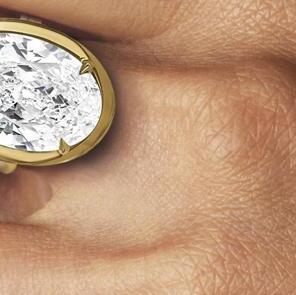



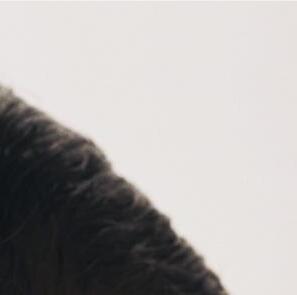









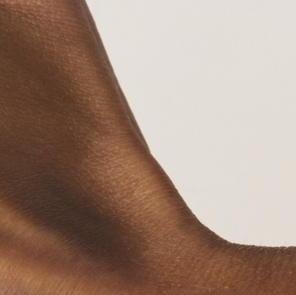




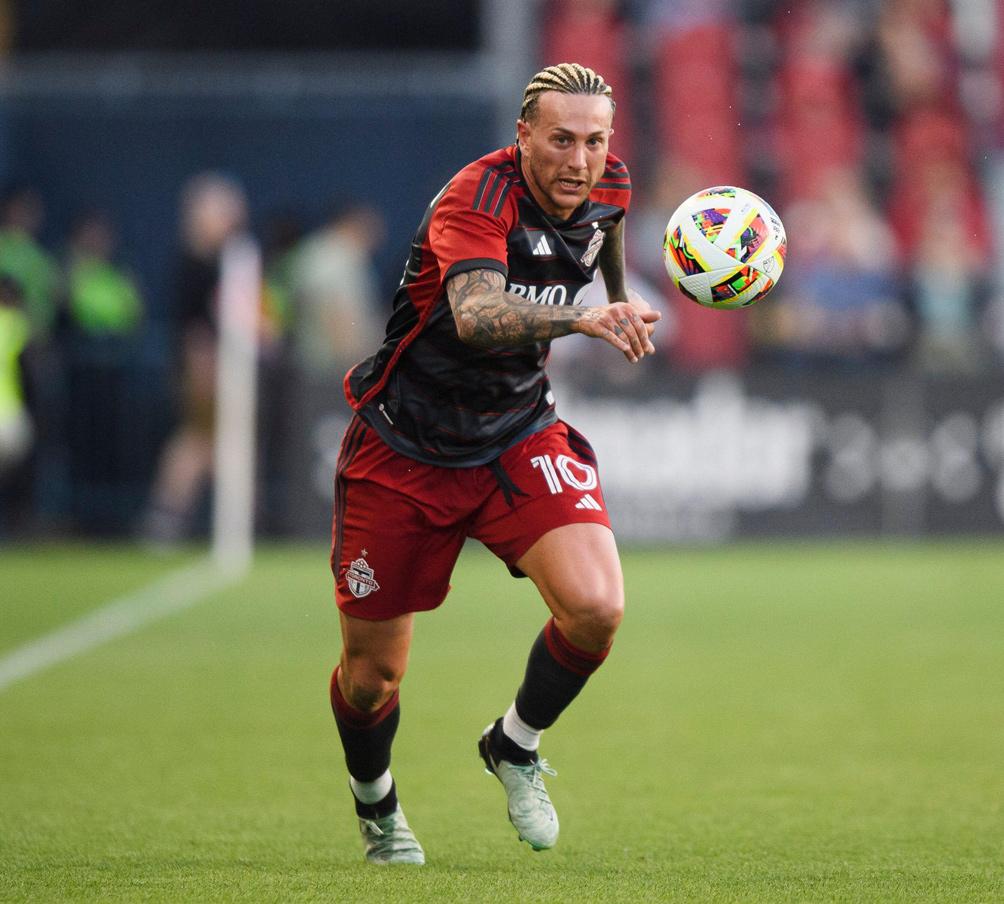
WELCOME TO TORONTO, the (relatively) new home of Fitzdares in Ontario, Canada!
Toronto is a vibrant city with an extremely passionate and unique sports culture.
As an Englishman who moved to Toronto from London earlier
this year, this is everything I’ve learned about the world of sport here, from the electric atmosphere of Maple Leafs ice hockey nights to the long afternoons watching Blue Jays baseball, the bizarrely fervent Toronto FC games, and everything in between…
Undoubtedly the most popular sport in Canada, and the Leafs are Toronto’s most beloved sports team. They are one of the original six NHL teams but are on a long drought, having not won the coveted Stanley Cup since 1967.

The atmosphere at games in the Scotiabank Arena is raucous but friendly, with rival teams’ fans sitting among the home fans. It’s certainly more aggressive on the ice than off it, with fights between players regularly breaking out.
The game itself is fast-paced and enjoyable, even if it is quite hard to follow. Matches last nearly three hours, so there’s plenty of time to spend your money on overpriced beer and poutine – a Canadian “delicacy” of chips covered in gravy and topped with cheese curds.
The Maple Leafs made the playoffs in 2023/24 but, having fought back from 3-1 down to 3-3 in the opening playoff round in a best of seven series, they lost in overtime in the deciding game against the Boston Bruins. The playoff games were on in every bar, restaurant and club in the city, with every man, woman and child wearing ridiculously oversized ice hockey jerseys.
Basketball
The Raptors became the first Canadian team in the NBA in 1995 and have enjoyed a huge amount of success. In 2019 they won the
NBA Championships, beating the Golden State Warriors 4-2. People still go on about ‘Raptors Fever’ five years on, the city having come to a halt during the finals, with regular tickets selling for thousands of dollars. They were led by legendary forward Kawhi ‘the Claw’ Leonard, whose nickname comes from the size of his hands, which measure 11.25 inches. A basketball is like a tennis ball for him.
They’ve struggled in recent years to match those heights, and the game I went to in January felt a little flat with their hopes for the season all but gone – but it’s probably the easiest non-British sport to follow and relate to.
Now the ice hockey season has ended, the city is obsessed with baseball and the Blue Jays. I was intrigued to see how a baseball game compared to a cricket match from a fan’s point of view. While I’m still not fully sold on it, like cricket it’s a great day out and a chance to drink and eat a lot –although food and drink prices make the Cheltenham Festival look like a Wetherspoon. A hot
WOODBINE MILE
$1 million, 1m for 3yo+
E.P . TAYLOR STAKES
$750,000, 1m 2f for 3yo+ fillies & mares
SUMMER STAKES
$500,000, 1m for 2yo
NATALMA STAKES
$500,000, 1m for 2yo fillies

dog can set you back Can$30 (£17) and a large Budweiser can be as much as $20 (£11.50).
It’s a simple but technical sport, with endless stands of strategy geared around statistics. They’ve recently changed the rules around time between pitches, which has sped up games, but going to a game still requires a healthy dose of patience.
TORONTO FC ‘Soccer’
Football is getting a lot more popular in North America. The 2026 World Cup is taking place in the USA, Mexico and Canada, and Toronto will host six games at the lakeside BMO Field.
Having been a season ticket holder at Aston Villa since 2005, I somehow managed to time my departure from England to Toronto during the middle of Villa’s best season for 30 years. It was therefore quite depressing watching my first Toronto FC game on the very same weekend I’d usually have been watching my beloved Villa secure Champions’ League football.
The quality is low in the MLS I’d estimate it’s on a par with the bottom end of the Championship
and the top of League One, with the odd star player looking a cut above the rest. The ‘Beckham’ rule was brought in to allow MLS teams the chance to break the salary cap to sign star players, which is how Lionel Messi has found himself plying his trade for Inter Miami.
In Toronto’s case, they have Lorenzo Insigne and Federico Bernardeschi. Insigne can barely run any more, but Bernardeschi, who scored the winning penalty against England in the Euro 2020 final, is a joy to watch.
The atmosphere is a cross between an Arsenal home game, with the new generation of forced flag waving and flares, and a passionate non-league fan base, who care little about the result of the game but enjoy the day out. It’s nothing if not entertaining.
Toronto has a beautiful racetrack called Woodbine, which has played host to some memorable racedays. It hosted the 1996 Breeders’ Cup, and many British trainers have successfully raided Woodbine in recent years. Charlie Appleby, David Simcock, Sir
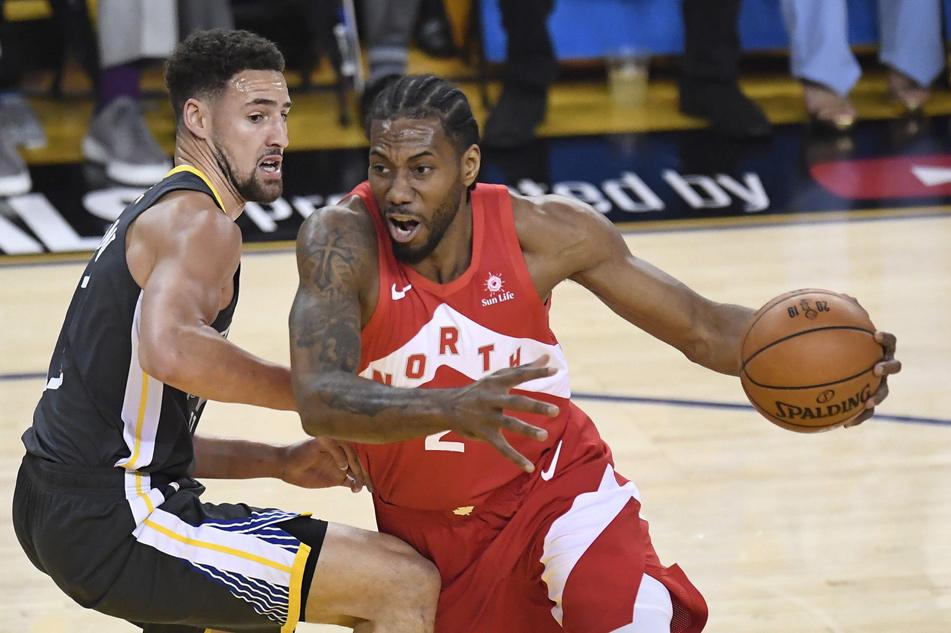
Michael Stoute, Ed Dunlop, Andrew Balding, Sir Henry Cecil and Paul Cole are just some of the British trainers to have won Grade 1s at Woodbine. Appleby and Godolphin in particular have enjoyed tremendous success of late, with Modern Games and Master of the Seas both winning
the Woodbine Mile en route to claiming Breeders’ Cup Turf Mile success in the same season.
I recently spent an afternoon at Woodbine and the track has an incredibly relaxed and welcoming feel to it. The viewing is fantastic and I can’t wait to be back later this year for their newly formed
Turf Champions Day on Saturday 14 September. There are now four turf Grade 1s on a bumper afternoon of action and it’s set to be a popular day for European trainers and racing fans. n
George Smyly is a communications guru based in Toronto.

Rafael Nadal has helped us forget that there was once a time when tennis’s kings of clay used to neglect the lawns of Wimbledon. Joe Hodgson pays tribute
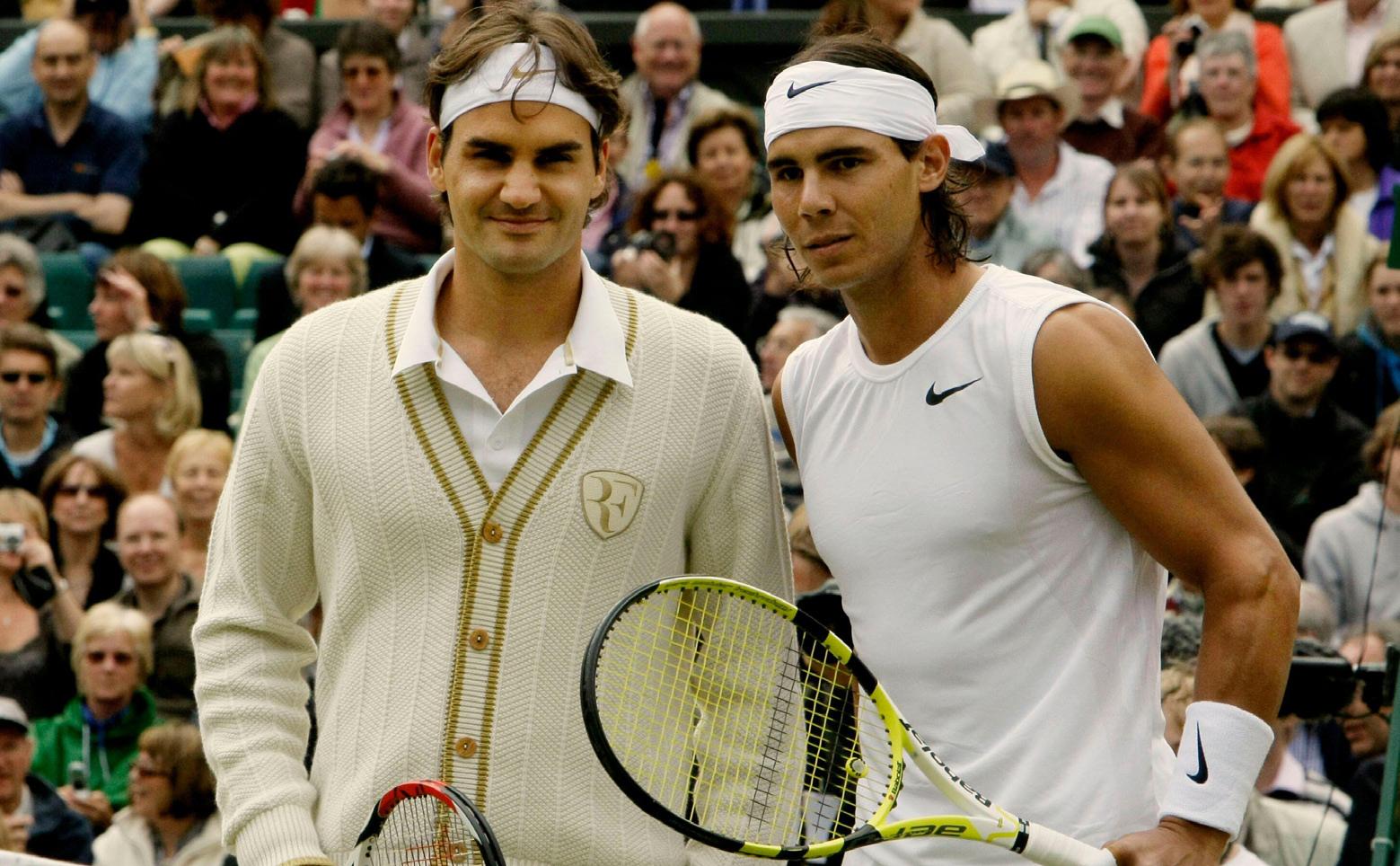
THERE IS A TV interview with a 16-year-old Rafael Nadal where is he asked: “What is the tournament you’d most like to win?” To which he replies, without pause for thought: “Wimbledon.” Before adding: “But it’s very difficult, I need to work hard.”
The first part of this answer is interesting because, at the turn of the century, when this interview took place, the tennis world was less unified than it is now. The clay season, particularly, was almost an island unto itself, dominated by players such as Gustavo Kuerten and Juan Carlos Ferrero. These clay kings espoused the ‘grass is for cows’ philosophy; they did not especially care about Wimbledon and rarely ventured beyond the first week at SW19
This selective approach to the game would change with the arrival of Roger Federer. He wasn’t just coming to control one tournament, one surface; he was coming for them all. It is often overlooked that Federer had already won three clay court Masters titles before Nadal won his first French Open in 2005. From that point on Nadal quickly became an unstoppable force on clay – but he shared Federer’s multi-disciplinarian desire. He was never going to undervalue Wimbledon. If I may paraphrase:
grass, actually, is for GOATs.
Which brings us to the second part of his interview answer. Nadal knew that, despite his enormous talent, glory would not come as easily to him on grass as it did on clay. The surface wasn’t as welcoming to his clubbing baseline approach; he was going to have to work for it.
That said, by July 2006, Nadal was already a Wimbledon finalist; defeated in four sets by Federer. The following year he was defeated again in the final by Federer, this time in five sets. And then came the famous 2008 Wimbledon final, also between Nadal and Federer. Many call this match the greatest in tennis history, and it is hard to contest the billing. There is something almost too perfect about the build-up, the match itself, and its legacy. Federer arrived at the final without dropping a set. Grass was still his surface. Although Nadal had been inching closer, Wimbledon remained a Swiss castle.
The contrasting playing styles and personalities of the combatants were effortlessly reflected in their attire. Federer took to the court in immaculate white trousers and a cream and gold monogrammed cardigan. Finesse in human form. Nadal, with his straggly long hair barely tamed by a bulky bandana,
These two differing approaches to
fashion and to physique combined to create a sporting spectacle like no other.
intimidating bronzed biceps exposed by a sleeveless shirt, was the personification of brawn.
But these two differing approaches – to fashion and physique – combined to create a sporting spectacle like no other. And the players could only be separated following five hours of thrilling pugilism, Nadal edging the victory, 9-7 in the fifth set. He knew it would be difficult, he knew he would need to work hard. But he had achieved his ultimate dream.
For Federer, conversely, it was the end of the dream. His ‘Camelot era’ was over. He had won an extraordinary 12 Grand Slams in five years, but he would never dominate tennis in the same way again. Nadal had raised the bar; had shown that the imperial Swiss was fallible, even on his best surface, and that his stylish exterior could be muddied and dulled with sufficient, persistent, precise enough force.
But despite creating history at Wimbledon, Nadal’s time as the supreme being in south-west London would be short-lived. Another player was about to raise the bar further still, and stake his own claim on the GOAT label. n
Joe Hodgson is a regular contributor to The Fitzdares Times in print and online.
For most sportsmen and women, their career can easily be reduced to a 15-second montage. For rare people like Rafael Nadal, even the montage package could run up to three hours. Here are four more memorable Wimbledon matches from the Majorcan magician’s extensive highlight reel, which prove that, despite possessing outrageous gifts, Nadal never dismissed the importance of sheer hard graft...
Nadal vs Tomáš Berdych 2010
After missing the 2009 event with a knee injury, Nadal returned to win this final in straight sets, proving that 2008 was no one-off.
Nadal vs Novak Djokovic 2011
A key moment in tennis history, as Djokovic defeated Nadal in the final to win his first Wimbledon title and establish himself as the sport’s new major franchise.
Nadal vs Djokovic 2018 This semifinal was the 52nd meeting between the pair, but it still took more than five hours for one player to find a way to defeat the other, Djokovic just edging it 10-8 in the fifth.
Nadal vs Taylor Fritz 2022
An extraordinary quarter-final epic which saw a clearly injured Nadal still manufacture a way to triumph against a much younger, seeded player. Despite winning, he would have to withdraw from the semi-final due to an abdominal tear.







With full form, past performance ratings, replays, video analysis, unique horse-by-horse comments, Speedform, charts, Computeform, value prices, FREE streaming, ‘To The Wire’ column and tips for every race


The Kordas are establishing a multi-sport family empire like no other.
Lola Katz Roberts looks at how a dynasty is developed
$35,498,329
IN PRIZE MONEY, TWO GRAND SLAMS, two Major Championships, an Olympic gold, and five elite athletes. That’s the Korda family in a statistical nutshell, but the real story of Petr, Regina, Jessica, Nelly and Seb is one of genetics, planning, hard work and a relentless pursuit of sporting excellence.
Keeping up with the Kordas would be an impossible task for us mere mortals because they belong to the nonpareil – a class of otherworldly beings with supernatural sporting gifts bestowed upon them.
Is that an exaggeration? In short, no. To produce not one, not two, but three children all rubbing shoulders at the top table of their respective sports is truly remarkable. While athletes do have a propensity to ‘keep it in the family’, it’s worth remembering for every Frankel there’s a Proconsul; for every Kaka there’s a Digao; and for every MJ there’s a Larry Jordan.
The point being, genes obviously count for something, but there’s a lot of work still to be done to convert all that genetic potential into success in the sporting arena. That’s where Petr and Regina have earned their stripes.
“Once a child starts to excel at something – whether it’s math, piano, pitching or ballet – he or she gets praise, admiration, and satisfaction. This builds confidence and makes the once not-fun activity fun.” So says Amy Chua in her seminal publication about parenting, Battle Hymn of the Tiger Mother
But imagine if the practice was fun? If cute kids donning pristine tennis whites enthusiastically took to the court to blast the ball with a cheerful thwack at the opposing baseline. Then imagine there are three of them.
Basically, being good at things is fun. We all know that. But even with prodigious natural gifts there are still 148 million people who play tennis or golf, so I’m sure each Korda child more than fulfilled their quota of Gladwellian 10,000 hours to push to the very front of that queue.
As a side note, it’s somewhat maddening when people argue that players like Mario Balotelli or Ravel Morrison “never fulfilled their potential”. Just reaching the professional game, being remunerated to play sport – that is achieving potential. To go beyond that – to plunder the heights of global top 100s – is something else altogether and achieving it with one child is remarkable, but to do it with three? That is scarcely believable.
As one football coach pointed out to me as I struggled to reach five consecutive kick-ups, practice does not make perfect, oh no no, practice makes competent. So, what did the Kordas have that I didn’t (apart from perfect genes, a smidge more talent and beautiful long, wavy locks of blonde hair)?
They had metaphysical idealism. Bear with me. The Platonic ideal of a forehand or golf swing was right there in front of them. Most of us attempted to recreate what we saw on the telly,
but for Seb, he could just ask his father: “Show me again.” And repeat until he was able to render his own forehand worthy of Plato’s approval.
I hear you say: “What if his father wasn’t there?” It’s true, most nascent tennis careers would wilt if the attentions of a Grand Slam-winning parent were diverted elsewhere. But the unique athletic gifts bequeathed upon the family gene pool ensured that father Petr being called away to caddy for elder daughter Jess as she made her first steps on the LPGA tour was no obstacle to Seb’s development into a potential Grand Slam champ.
Handily for young Seb, mother Regina, a top-30-ranked tennis player
in her own right, was able to step in and mould his game, spending hours with him on court to nurture his natural talent and shape it into one of the 30 best on the planet.
Another unique footnote to the Korda story is the astonishing synchronicity of the siblings’ success – almost like it’s all been Koordinated (sorry,
Petr and Regina didn’t leave the genes to their own devices; they fabricated, stitched and tailored them.
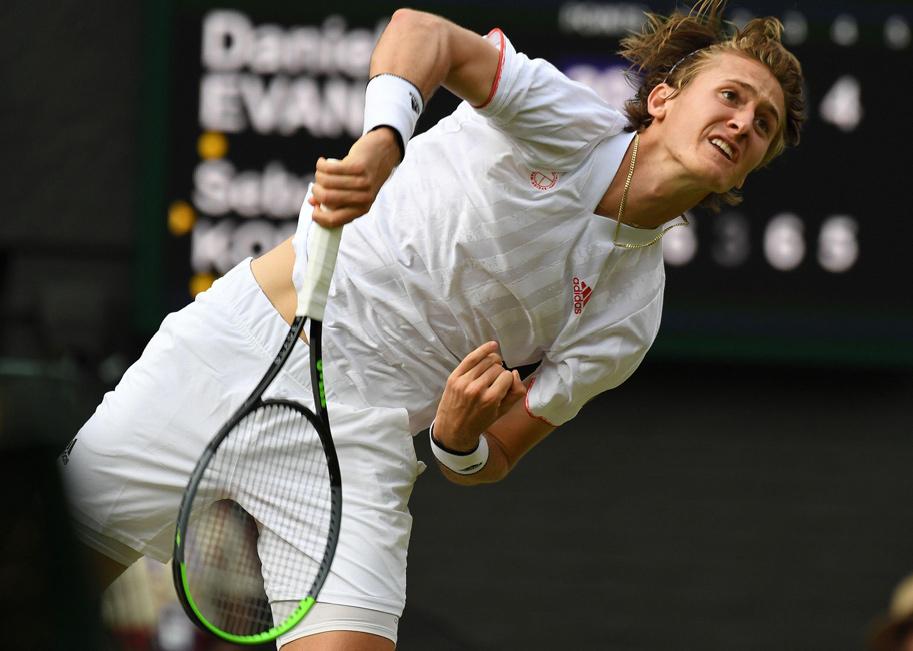

couldn’t resist). While genetics may have pre-ordained their pathway to greatness, devising three sporting careers to peak simultaneously doesn’t happen overnight. Petr’s former manager Patricio Apey told the New York Times: “As crazy as it sounds, Petr and I have been talking about this for like 12 years, to do these things together with the three kids. I always say he’s half-genius and half-crazy…”
Plenty of parents harbour resentment about the many hours of their weekends they donated to supporting their children’s athletic endeavours. To think the Kordas managed to navigate the exploits of three sports-playing children without a full-time secretary and driver is staggering. Florida is a very big state, for starters. You’ve got to hand it to them. They must have been very organised. All of that speaks to the elite mentality of the Korda parenting,
with every Saturday executed like a sliced backhand approach to the net before putting the volley away into the open court. Petr and Regina didn’t leave the genes to their own devices; they fabricated them, stitched them, tailored them.
I bet those games of Monopoly at Christmas were tense tactical affairs. I still get a shiver down my spine thinking about the humiliation of my little brother charging me exorbitant rent when I had the misfortune to land on his Park Lane hotel…
Competition drives innovation, but sibling rivalry drives success. While the Korda sisters are able to put rivalries aside out on the golf course (where Nelly is a clear world No. 1 at the moment), there is no doubt that being side-by-side with your sister
while competing in major global tournaments helps to make it just another day. It’s Christmas Monopoly, the race to the Xbox, the fight for the best snacks in the shop. In other words, survival of the fittest, every day.
As for Seb, who calls himself “the worst athlete in the family”, he may not have a sibling competition on the tennis circuit, but he does have his dad’s shoes to fill. It’s easy to imagine those father-son backyard matches meant that little bit more.
So that’s how an athlete is made. The word ‘dynasty’ is overused in sport, but the Kordas are well on their way. And Seb has clearly inherited his father’s eye for a mate with sporting gifts: his long-time girlfriend is Ivana Nedved, daughter of Pavel, and he wasn’t half bad, was he? n
Lola Katz Roberts is Assistant Editor of the Fitzdares Times.
The Klitschkos
Heavyweights in every sense, Ukrainians Vitali and Wladimir set the standard in their division. Vitali’s 87 per cent knockout rate is one of the best of any heavyweight in boxing history, while Wladimir went unbeaten for more than a decade.
The Mannings
Four rings, three Super Bowl MVP awards and nearly 130,000 passing yards between them. Peyton is considered one of the greatest QBs of all time, while Eli will go down in history for stopping Tom Brady’s undefeated Patriots in 2007. Honourable mention goes to the Kelce brothers – but dating Taylor Swift doesn’t quite match the helmet catch...

From software to stallions, and even British fizz, Graham Smith-Bernal has the eye for business.
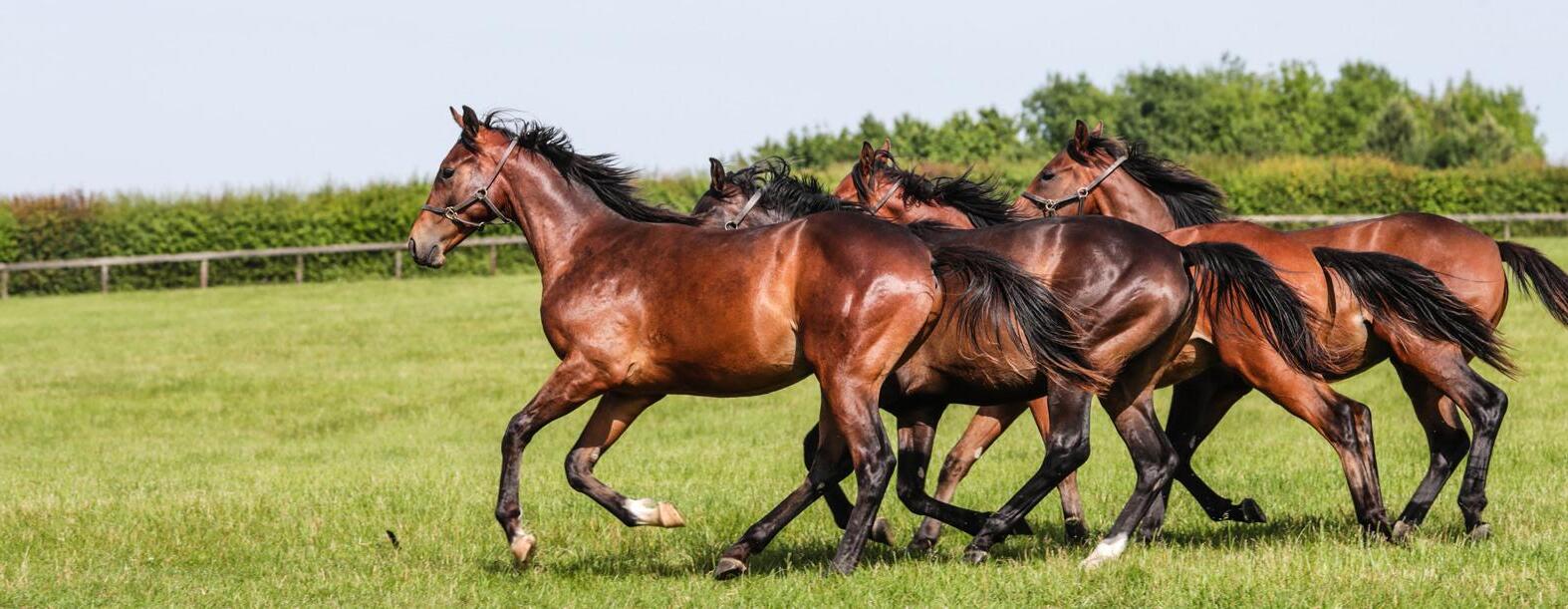

SET IN 1,200 ACRES OF HERTFORDSHIRE COUNTRYSIDE stands Newsells Park Stud. For context, that’s six times the size of Royal Ascot. Seventeen properties adorn the site, including a 20,000 sq ft manor house. In the hands of the Jacobs family and more recently under Graham Smith-Bernal’s leadership, Newsells have established themselves as Europe’s leading commercial stud, topping Tattersalls’ Book 1 sale (the world’s most prestigious thoroughbred sale) in eight of the past nine years. Every year they breed the most coveted equine talent in the world, standing a trio of blue-blooded stallions: former world champion three-yearold Nathaniel, Royal Ascot scorer A’Ali and Frankel’s fastest son, Without Parole. But it’s not all plain sailing, as the man at the helm explains.
“Investing in bloodstock comes with its risks,” he says. “If the horses don’t make Book 1 at Tatts, the returns are going to be significantly lower. On the flip side, you can typically make around 40–50% gross profit on sales if you do make it to Book 1.” You might be wondering how the man behind a multi-million-pound software company ended up in the very hardware world of bloodstock. Believe it or not, it was horses, not computers, that first got him wired with excitement.
“Almost 30 years ago, I came together with some friends to buy a couple of horses – but only at a low level. We had a couple of winners and some placed efforts, but at the time my software company was taking off in the US as well as the UK and I was out of racing for the best part of 10 years. Then completely out of the blue, about a decade ago, a friend from Tottenham Hotspur’s 125 Club asked if I wanted to go in with him on a few horses. Knowing my passion for racing, it wasn’t a hard sell! After a little too much to drink in the red room at Tattersalls, I ended up buying a couple of foals – luckily, both went on to do rather well on the track.”
By the time he got to 10 horses in training, the focus switched towards breeding. “I was introduced to Julian Dollar, the general manager at Newsells Park Stud, and frankly, I couldn’t have been any more impressed by the level of service and professionalism that was on offer. In a world full of shady characters and suspect shenanigans, Julian and his team turned out to be about as straight as they come.”
Having become close to Julian and the wider team at Newsells, Graham was on red alert upon learning that the stud was potentially heading under the hammer once the Jacobs family signified their intention to sell. “I was already a client there, but Newsells was also home to some of the top breeders in the world and many champion mares.”
‘Some of the world’s top Champagne houses are buying up our south-facing chalk, including the likes of Moët, Vranken Pommery and Taittinger.’
HAVING COMPLETED THE SALE, GRAHAM purchased tens of millions worth of bloodstock, including Shastye, dam of Group 1 winners for Ballydoyle, Mogul and Japan. “We also had the mare Shambolic in partnership with Merry Fox Stud. Her first foal was Ylang Ylang, who won the Fillies’ Mile as a two-year-old and looks to have an exciting career ahead.”
In less than four years under Graham’s stewardship, Newsells had bred a Group 1 winner, servicing the Coolmore ‘lads’ as well as some of the other wealthiest operators in the world. But to think of Newsells Park as just a stud farm would be churlish. Spotting a commercial opportunity is clearly something Graham thrives on, and in 2022 Newsells became
the first stud farm in the UK to plant 45,000 vines. Perhaps to the naked eye, this seems a strange crossover, but as ever, there’s method in the madness.
“For some years now, England has been a place where you can grow grapes to make sparkling wine. We have the same vein of chalk that goes through the Champagne region, through the South Downs and up through to Cambridge [15 miles to the north of Newsells]. Climate change means it’s becoming increasingly difficult in the Champagne region for growing the varieties of grapes required for long-lasting, preserved sparkling wine. Despite the wet weather, England is perfect for this.”
But don’t expect to see this sparkling wine in the supermarkets. This is a club, and joining the Newsells Park winery will provide members with a far from typical experience. “Aside from simply heading to the vineyard and having a nice lunch, you’ll see some of the beautiful foals on the ground. Depending on the time of year, you’ll see how we prep our yearlings for the sales. Members will even get the chance to see the great Nathaniel. It’s a much broader experience than what is out there already. That’s where we’re differentiating.” Blue-blooded equine talent? Check. Sparkling wine? Clink. So what’s next for Newsells? “We’re focused on continuing to breed some of the finest racehorses in the world and reinforcing our position as the commercial leaders in that space,” says Graham. “But increasingly, we want to build more partnerships, through launching different syndicates and even further diversification.” Fitzdares has seen that diversification first-hand. Newsells recently played host to our annual Royal Ascot preview night, featuring a host of the biggest names in racing. Watch this space to see what’s next… n Graham spoke to our Editor, Henry Beesley
What price a shock result in the election? Never say never, says
Michael Howard, who knows a thing or two about entering a campaign as a rank outsider…
ISHI SUNAK ’ S DECISION
Rto hold the general election on 4 July took everyone by surprise. That certainly included me. But the initial controversy over his decision has, as was inevitable, subsided and all minds are now focused on the outcome.
As everyone knows, the Conservatives go into this campaign as the underdogs. I have some experience of leading a party into a general election campaign as the underdogs: in 2005 I was leader of the opposition and Tony Blair was the strong favourite to win. I don’t want to draw too many parallels between the two, not least because I lost and I still very much hope that the Conservatives can win this time round. And, of course, fighting an election as prime minister is very different from doing so from opposition.
But what I found – and what I suspect Rishi will find – is that you put the polls out of your mind and focus on doing your very best in the campaign. It’s a gruelling business, with practically every minute of the day accounted for, but I hugely enjoyed it. As leader of the opposition it’s what you’ve been gearing up for, and I found it rather exhilarating to meet so many people in so many different parts of the country, even though there is obviously a whistlestop element in all that’s involved. So I hope Rishi enjoys it, too.
One of the curious (and little mentioned) things about this election is that, in my view at least, there is a paradox at the heart of it. Many people, and I am one of them, think that the medium-tolong-term prospects for our country are very encouraging. We are particularly well placed to take advantage of the biggest opportunities facing the world over the next few decades.
As the world gets richer and older, its demand for things like financial services, new medicines and cultural and sporting pursuits will grow exponentially. The United Kingdom is one of the two great financial centres in the world and the biggest exporter of those services. Our pharmaceutical sector is also one of the world’s powerhouses, and our
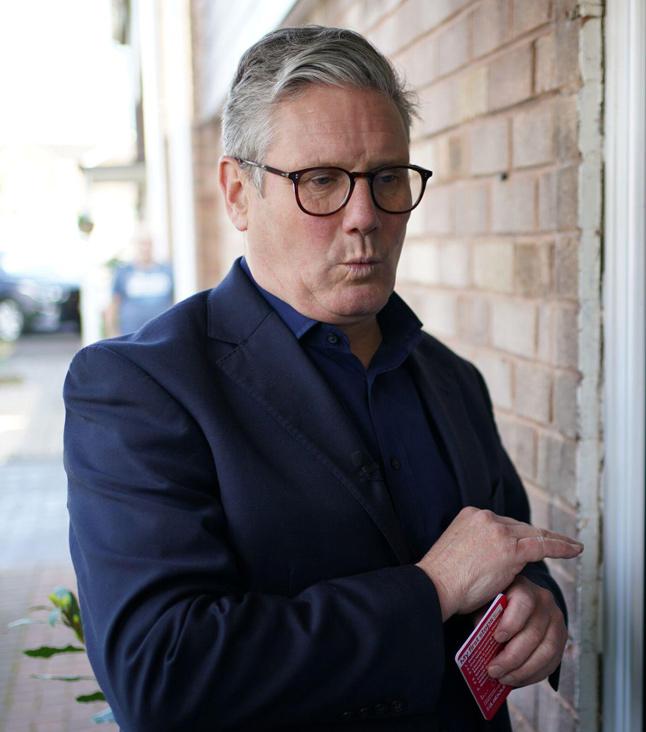
creative arts sector sets the standard for so many others. We have a significant capability in technology and artificial intelligence. In sport, the Premier League is watched with passion everywhere and supporters of our leading clubs can be found in large numbers on every continent.
But the short-term fiscal outlook for any future government is undoubtedly very challenging. This is because the cost of the furlough scheme, which helped so many businesses to survive the pandemic, and the cost of helping people with their energy bills, which have soared as a result of the Russian invasion of Ukraine, have led to a considerable increase in government borrowing and taxation. These policies, which, for good or ill –and I and most people would, I think, recognise as being for good – were the responsibility of Rishi Sunak, first as chancellor and then
One of the curious things about this election is that there is a paradox at the heart of it.
as prime minister. But most of those, including the Labour Party, who were critical at the time wanted more, not less, spent on these schemes. As a result there are constraints on public spending, which will mean that whoever forms the government after the election will have very little room for manoeuvre.
LABOUR HAVE PROMISED not to increase income tax or national insurance, but will they increase property taxes, possibly by introducing new and higher bands for council tax? Perhaps this will become clearer during the campaign.
Both parties acknowledge that the holy grail is economic growth. And the very latest figures show that we are growing faster than most comparable countries, including even the United States. But economists always warn against reading too much into one quarter’s figures.
What everyone recognises is that economic growth depends on the performance of our wealthcreating private sector. It is far from clear that Labour’s proposals for enhancing workers’ rights will
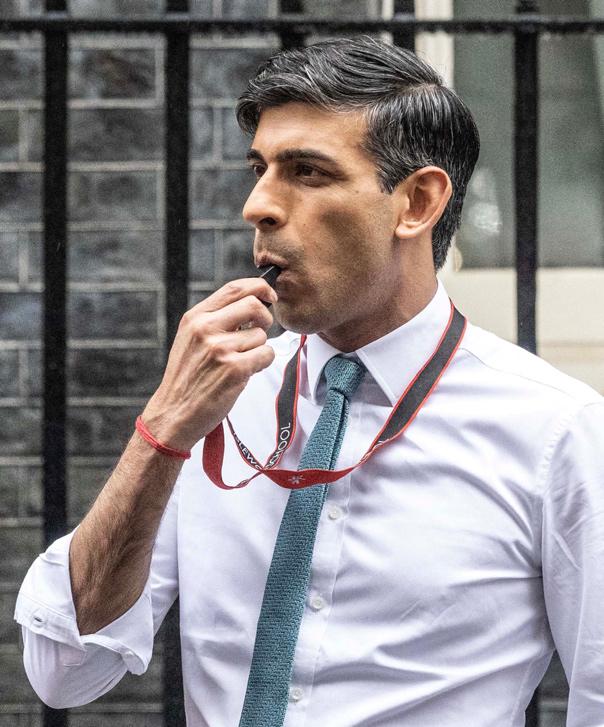
NATIONAL SERVICE
With the ink barely dry on the front pages after Rishi Sunak announced a ‘snap’ general election, the PM unveiled a flagship policy pledge compelling teenagers to perform mandatory national service when they turn 18. Is that the 1960s calling?
THE EDSTONE
Some called it “a weird commie slab”, others called it Miliband’s Monolith, some cited a lack of planning permission, but to most it was “the Edstone”. Almost as ill-fated as that bacon sandwich, the 8’6” plinth with six election pledges carved onto it was rumoured to be destroyed. One thing is for sure: it’s never been seen since.
HUG A HOODIE
In an attempt to escape the “nasty party” label, David Cameron wheeled out his ‘Hug a hoodie’ policy, exhorting more empathy for young criminals. Unfortunately, the policy was shelved after Danny Kruger –the aide who wrote the speech – was mugged by a gang of boys wearing, you guessed it, hoodies…
help to achieve this very desirable outcome. If you make it easier to strike and more difficult for employers to run their businesses, you are hardly creating the environment in which economic growth is likely.
The other great issue, which has rarely featured in previous election campaigns, is defence. Everyone agrees that we are living in a very dangerous world, and there is a clear difference in the commitment of the parties to take action in this area.
Are there differences which might particularly affect clients of Fitzdares? Both parties seem committed to the establishment of the football regulator, and the election is unlikely to influence the future of the Financial Fair Play rules which many of us – and I confess I speak as a Liverpool fan – would like to see strictly enforced.
But almost every other area of our national life will be affected by the outcome of the election. We only have a few more weeks before we know our fate. n
Michael Howard, Lord Howard of Lympne, was leader of the Conservative Party 2003-2005
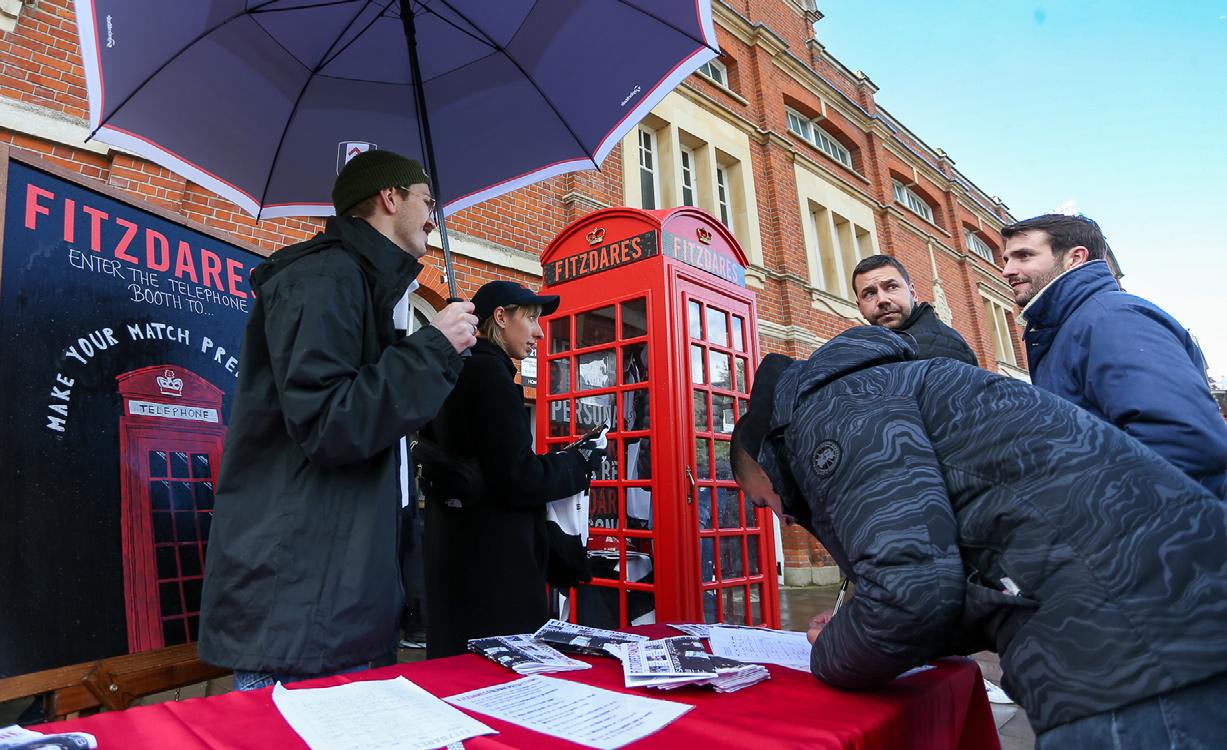

In February we ignited our FULHAM FC partnership with a touch of fire in the booth, inviting fans to make pre-match predictions from our mystic phone line. Turns out they all knew Rodrigo Muniz would be on the score-sheet: he duly obliged with an expertly-taken finish in the 32nd minute.
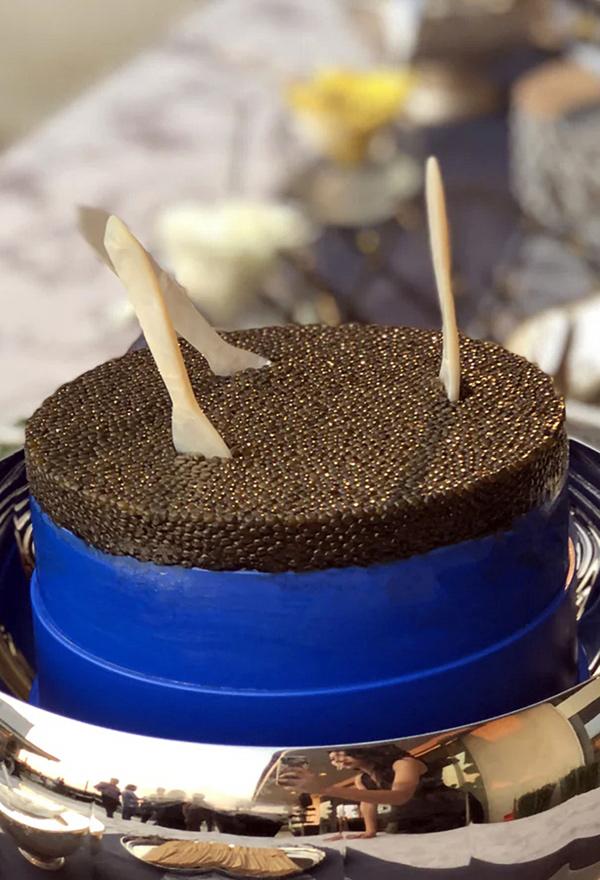
Consider this your official invite to our ROYAL ASCOT PICNIC. Like last year – only better – you will find us in the Owners & Trainers Carpark under a
on Wednesday 19th June.


We provided all the usual Fitzdares fanfare for our members during this year’s CHELTENHAM FESTIVAL Once again, we brought a taste of Mayfair to Prestbury Park as almost 500 members enjoyed our signature Black Velvet at our Club on course in the Orchard. Once again, we lowered the drawbridge to the Fitzdares Castle as guests were treated to four-poster beds and spiral staircases ahead of the biggest week of racing on the National Hunt calendar.


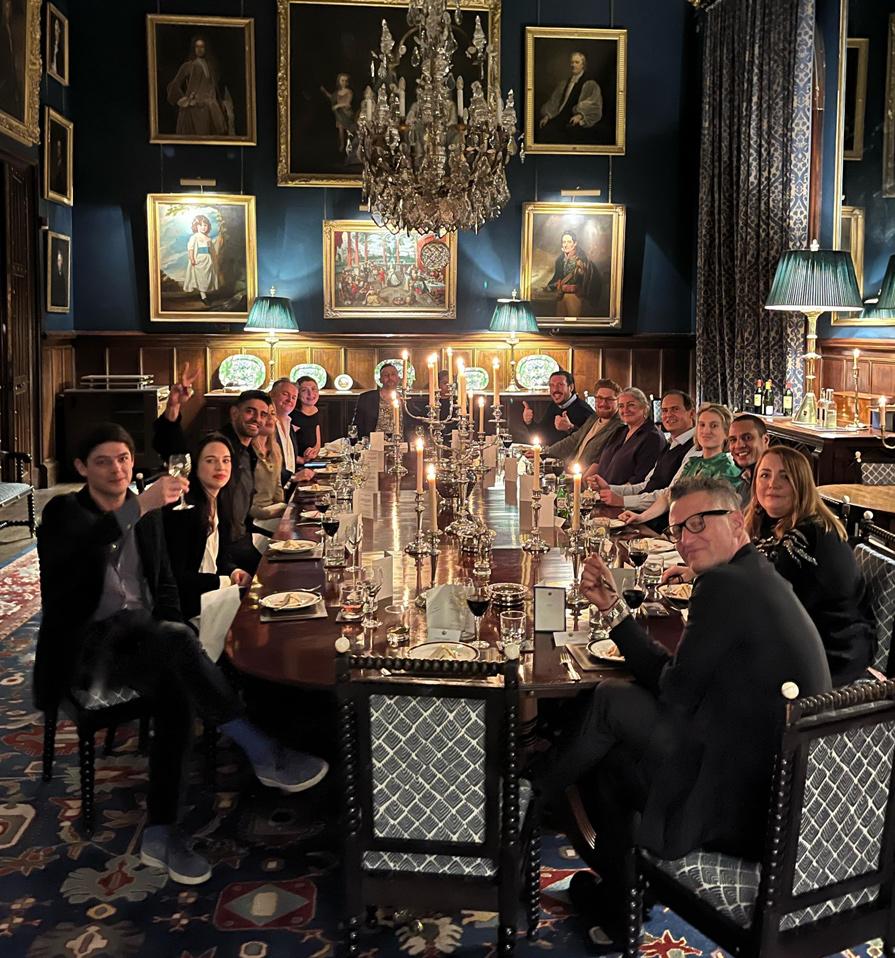




glued to the telly at home, or in the thick of it in the Royal Enclosure, we will be there to guide you through Royal Ascot. Pick up the phone and call or text on the morning of the first day, and if you quote our secret password: KISS MY ASCOT you might just get a cheeky price boost or free bet from one of our brokers...
If you’ve watched England play cricket in any format over the past 20 years, you’ll know all about Stuart Broad. Having made his England debut in 2006, Broady spent the best part of the past two decades as one half of England’s formidable opening bowling attack, alongside best pal and swing king Jimmy Anderson.
After he went on record to say that he’s “obsessed with Ashes cricket”, it won’t come as any surprise that Broadly Speaking focuses heavily on those five Test matches played every two years as the story alternates between his career as a whole and last summer’s Ashes series, which was his last. And yes. He does discuss that Jonny Bairstow dismissal at Lords!
While not all great athletes bow out on their own terms, Broady left the game of cricket at the peak of his powers. He delves deeply into that famous final day at the Oval last summer. With England facing a race against time to bowl Australia out and level the series at 2-2, step forward Stuart Broad. England’s talisman took the last two wickets, sparking jubilant scenes as the hosts denied Australia a first away Ashes win since 2001.
He also treats the reader to an insight into his trademark ‘Bail Mary’ trick, whereby he switches the

bails at the non-striker’s end in the hope of changing his luck. He describes it an “act that united two features that ran concurrently through my life on a cricket field but didn’t always naturally align – a desire to enjoy myself and a desperation to win”.
Here, we see the two sides of Broad that have defined his career: a cheeky, sometimes petulant character, but ultimately a highly
A cheeky, sometimes petulant character, but ultimately a highly skilled athlete with an insatiable appetite to win.
skilled athlete with an insatiable appetite to win. We also don’t just see Broad the man. He touches on his early cricket achievements but is self-aware enough to refer to his strong footing in the game straight off the bat, given his father, Chris, played 25 Test matches for England.
Broady gives an honest review of Bazball, England’s rock ’n’ roll style that has earned its share of fans and sceptics in almost equal measure throughout the cricket world since Brendon McCullum (Baz) took over as head coach in 2022. He describes
the brand of cricket as “liberating”, taking him back to his early days on the cricket pitch. Back then it wasn’t about how many wickets he took or how many runs he scored; it was about “enjoyment”. This laissez-faire approach clearly paid dividends in the twilight of a glittering career.
It’s not all sunshine and roses, though. Broady delivers a vivid account of that Yuvraj Singh over in the T20 World Cup in South Africa in 2007, describing Singh’s ballstriking as “mouth-drying”. He describes how that experience led him to adapt his bowling approach, illustrating his ability to look forward, not back.
It’s not all about cricket, either. A keen golfer and passionate Nottingham Forest fan, he details his love for top-level sport and the intensity that it takes to reach the summit. Ultimately, Broadly Speaking is an easily readable and candid account of the incredible highs and excruciating lows of one of England’s greatest cricketers of all time. There’s technical insight and pearls of wisdom in almost equal measure and anyone who’s a fan of elite sport, in any capacity, will thoroughly enjoy it. n
BROADLY SPEAKING is published by Hodder & Stoughton (£25).
1. Newly promoted side, Town (7)
4. Machine (5)
7. Law firm acronym (3)
9. Swedish golfer (6,5)
11. To argue, boat action (3)
14. Heavyweight exchampion (7,6)
17. Pen juice (3)
20. Retired cricketer in 2023 (6,5)
23. ___ Barker, former tennis star (3)
24. Course (5)
25. Newly added Olympic sport (7)
505/1
£100 FREE BET for one person, chosen at random from all correct entries! Email lola@fitzdares.com
1. Defeated England 2-1 in 2016 (7)
2. Derogatory Spurs nickname (5)
3. Hawaiian dance (4)
4. On the boundary (4)
5. Illegal bowling action (5)
6. Boxing matches (6)
8. Cricket dismissal (3)
10. F1 line-up (4)
12. Fitzdares-sponsored racecourse (3)
13. Islamic headgear, plural (6)
15. British flat racing classic (4)
16. The Biscuit Men (7)
17. Useless (5)
18. French racecourse (3)
19. Indian cricketer (5)
21. World heavyweight boxing champion (4)
22. Dortmund legend (4)
